THE SIXTH FORM EXPERIENCE PROSPECTUS
Entry September 2024

Entry September 2024
Most Progressive Independent School in London
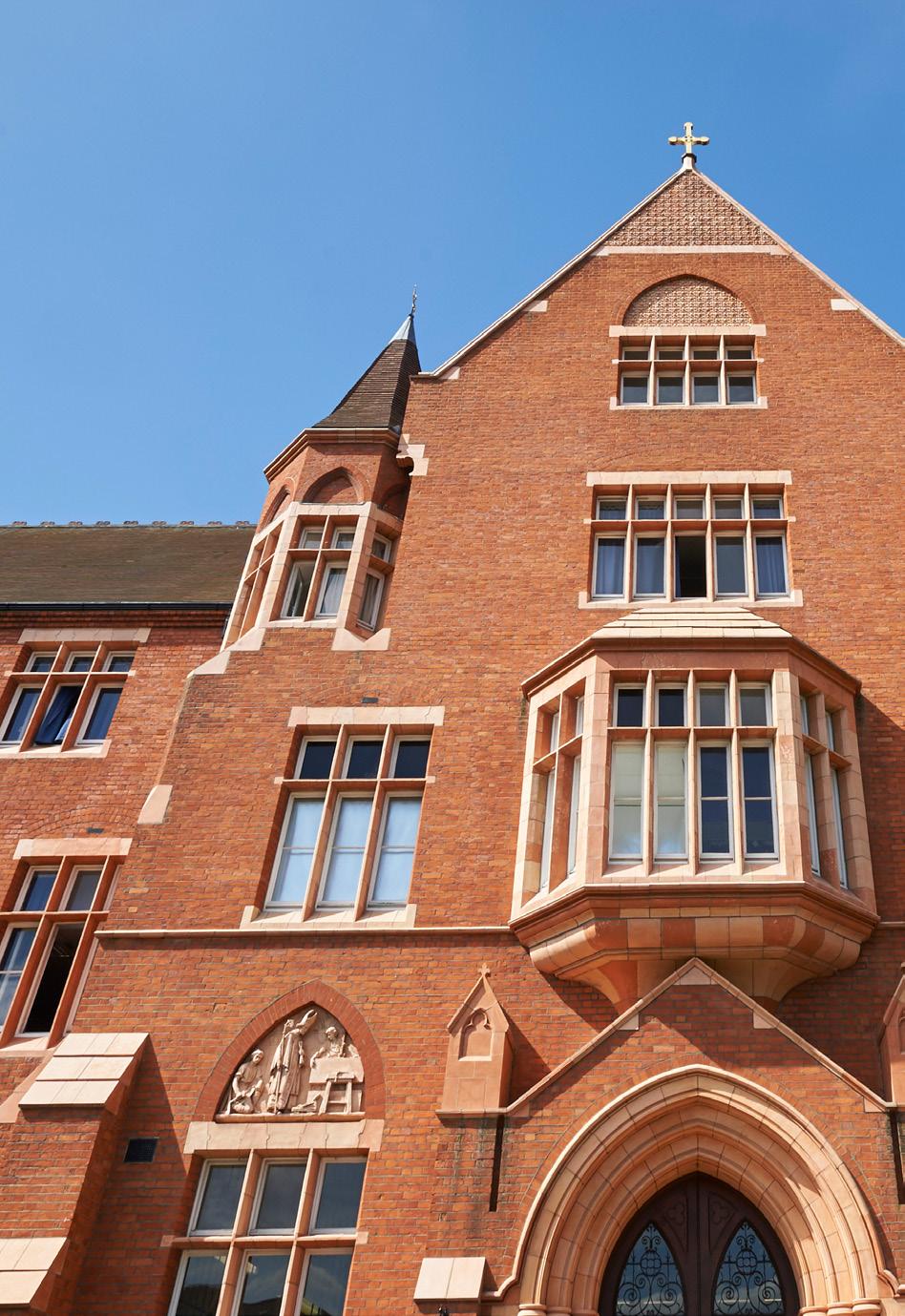
Private Education Awards 2023
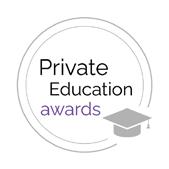
Independent Senior School of the Year
Tes Awards 2022

Coeducational Independent School of the Year
Independent Schools of the Year Awards 2020
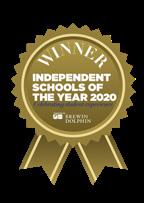
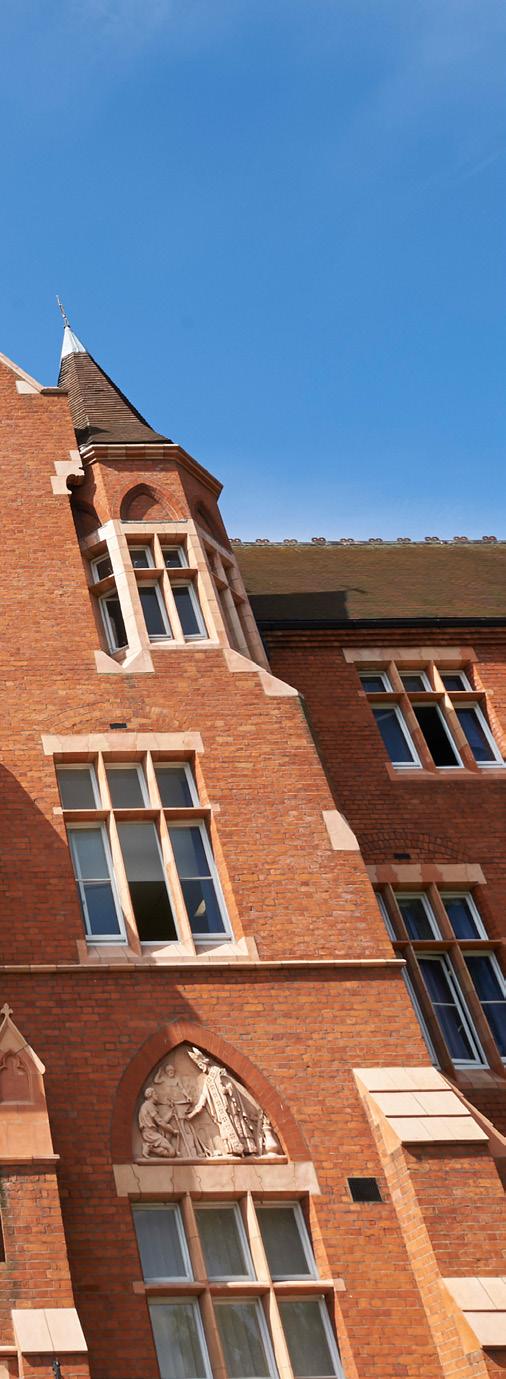
We are a little different at St Dunstan’s. Set in the heart of southeast London, we are proud of our vibrant and diverse community, contemporary values and shared histories.
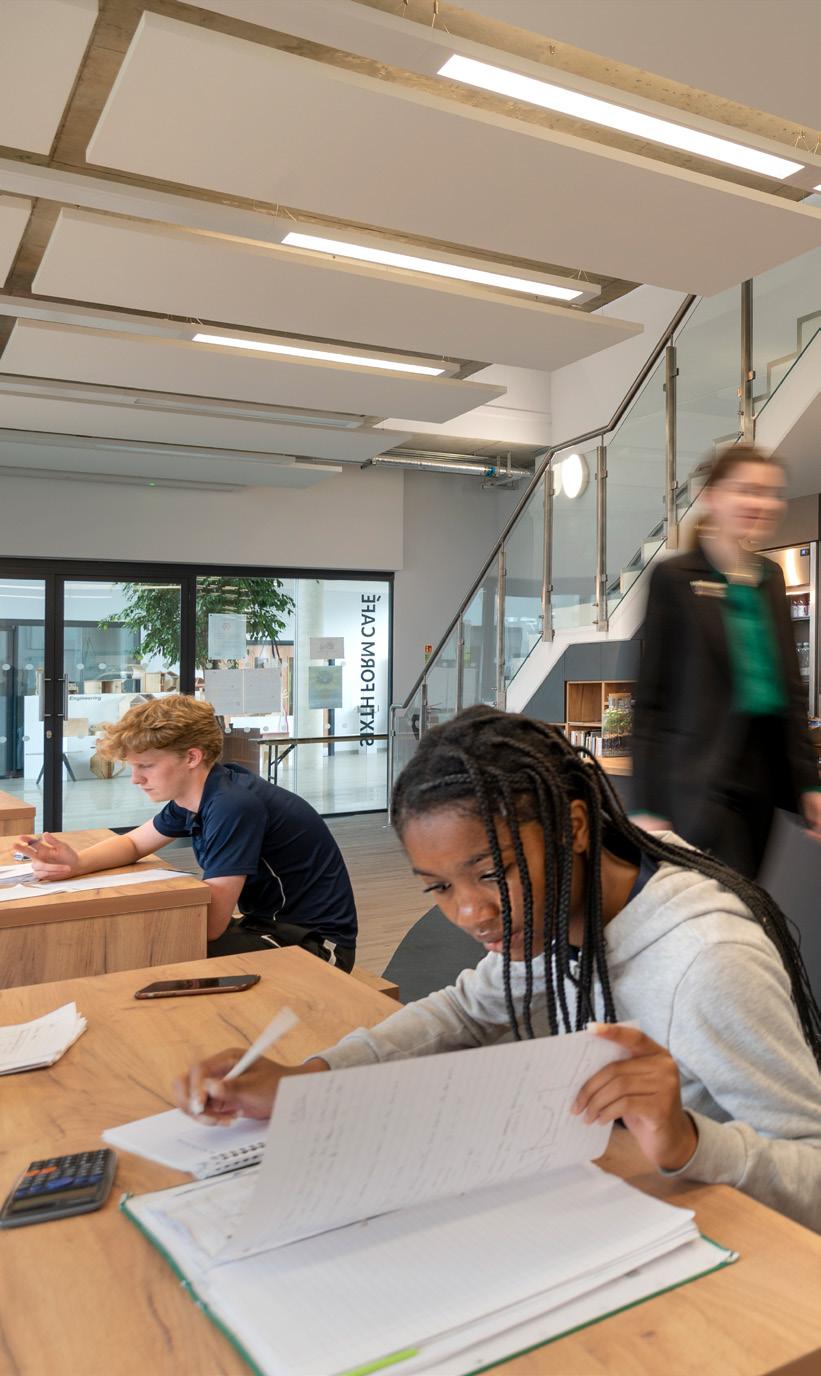
It is from this unique proving ground that we produce students of dynamism and excellence. They are academically gifted with a sense that the future is theirs to shape. This comes from a dedication to their studies and a wish to test theory against the prevailing thinking of the day. How do we achieve this? First, by careful selection of a cohort of students for both their mind and their values. And then by building a collegiate-style relationship between teacher and student, finding out what each wants to achieve in whatever field of life they choose, and supporting each to be the leader of their own journey. Similarly, we look to learn from our students, taking their view of the world and having it better mould our own in a mutually rewarding partnership. To enhance this potential, we look at a student’s character alongside their grades, and we think about individual futures holistically, not simply through academic ranking.
In recognition of this fact, the Sixth Form experience here is exemplified through the St Dunstan’s Diploma which seeks to capture the breadth of your academic and personal development across your two years with us. Besides the enrichment of the mind, becoming specialists in their chosen A Level subject areas, students also learn to apply their knowledge-base practically, so that they will learn to run a bank account, communicate using sign language, climb a rock face, lead a discussion, or plan and host a community event. These aptitudes are as important to us as the training required to take a traditional exam.
If the future is uncertain, then today we should prepare for that unknown. Together we embark upon a collaborative journey of adventure and discovery, allowing individuals to flourish and talent to manifest. Join us in becoming your future, today.
Mr A Brewer Head of Sixth Form, St Dunstan’s College
The St Dunstan’s College Diploma is a flexible, choice driven, forwardthinking and ambitious programme of education that is designed to help Sixth Form students transition successfully to an adulthood of personal flourishing.

Complemented by our state of the art Sixth Form study space, café and learning resource centre, the Diploma fosters the perfect environment for the acquisition of knowledge, and the shaping of character, whilst preparing our young people to help lead in a future not yet written. Thus, there are three strands to the Diploma: Knowledge; Character; Futures. The Diploma acts as a framework through which academic A Levels are delivered and supported, but is
augmented by a range of specific courses and opportunities that are designed to develop the breadth of a young adult’s educational journey. A St Dunstan’s Sixth Former will be industrious, self-motivated and supported by the diverse community that is the hallmark of our College. Unafraid of new challenges, because they have the support of their friends and mentors, our students see their chance to hone all of their talents and so lead their fellow students in an experience of shared exploration - building friendships for life. The Diploma links directly to the College values of Courage, Creativity, Confidence, Compassion and Curiosity, but these values now take on a new role through the opportunity to learn and take on leadership responsibilities. In this way, through dedication and industry alongside a committed team of tutors and mentors, the students create a true foundation to make a success across all areas of their lives.
A Levels are the core of the Diploma and provide the basis for the acquisition of knowledge necessary to access top-tier higher education provision. Sixth Form students begin by choosing four subjects in Year 12 that are best suited to them and their academic interests. These will provide the grades and UCAS points that universities need to see, and will also count towards their Diploma. Based on progress reviews and consultation, they may reduce their profile to three A Levels at an appropriate time after the end of their first term. This process is always supported and guided by the Sixth Form tutors and the Academic Leadership Team – For the full assessment and consultation timeline, see page 60 and 61. There is a selection of 24 subject courses on offer across the academic spectrum, appealing to many interests, so allowing powerful UCAS applications to be built for university and beyond. We are excited to have added Politics A Level to the 2023 offering, following student feedback from College Parliament. An Extended Project Qualification is also a core offering on which all are auto-enrolled when joining Year 12 and, as interests develop during the two years, can be taken to its full qualification stage or set aside to concentrate on other areas of personal development depending on individual need.
Unlike GCSEs, A Level subject choice is up to you – there are no ‘core’ subjects that all students must complete, though we do guide you in sensible combinations of subjects when thinking of post-College life. To become a doctor, for example, you must take Chemistry and Biology, and give proper consideration to Mathematics as a further addition. You are studying A Levels because you want to, so of course you are expected to be more independent in your approach to learning than you were at GCSE. You should think about the skills required for success – for example, Chemistry, Physics and Economics all have significant mathematical components and would therefore not suit a student who dislikes or struggles with Mathematics. Many other subjects, such as Art or Drama have significant coursework or essaywriting requirements which may make certain combinations of subjects difficult to time manage. This is not to say you will be ‘on your own’ – quite the contrary! You will have more time with your subject teachers than you did at GCSE, your classes will have fewer students, and your teachers will be more available to offer assistance when you need it. Your teachers will be mentoring you to think more independently, work more autonomously, analyse your own work and express your own thoughts and opinions. That’s part of the excitement of Sixth Form study here. In order to guide your choices, we advise first and foremost that you choose A Level subjects that you enjoy and are good at:

● A Level study will require you to spend many hours outside of your lessons studying, extending, revising and consolidating your learning.
● You will be expected to read beyond the syllabus, analyse your own work and confidently express your own thoughts and opinions. It will be very difficult to commit to this level of study if you do not enjoy the material that you are learning or if you find the material very difficult to access.
● Your future prospects are far better served by strong grades in subjects you enjoy than by weaker ones in subjects you thought you ought to take.
● We are able to accommodate most students’ first choice of subject combination. We provide ‘option blocks’ of subjects for students to choose from in order to maximise the possibility of meeting student subject requests. These blocks are produced annually, based on early indications of subject selection from current students, and help us to timetable teachers and classes to meet these demands.
● The full list of each course’s specification and content description can be found at the end of this prospectus.
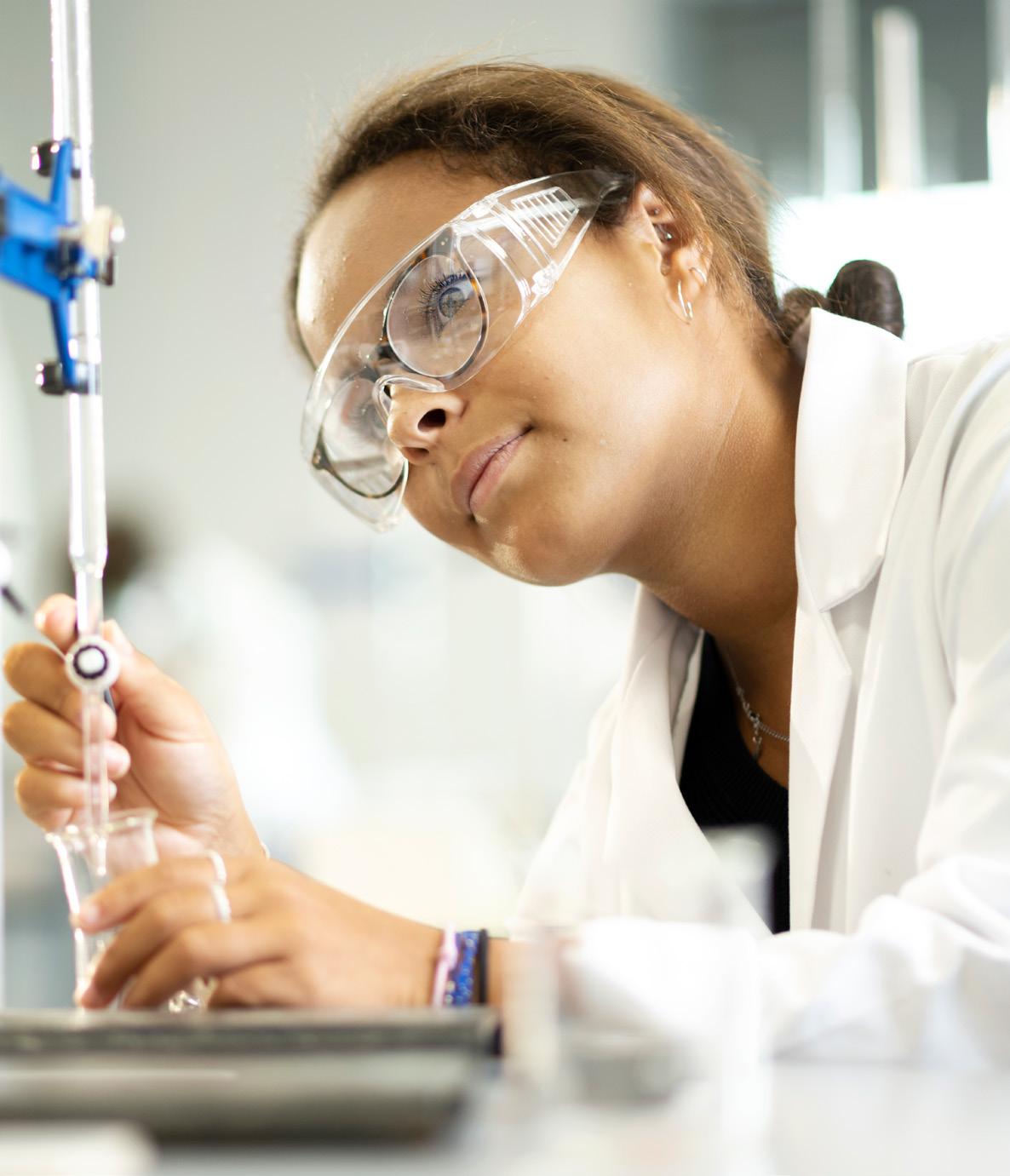
We harness the individual potential of each student by offering a host of opportunities to develop their leadership and organisational skill sets. In this way, each person’s talents are enhanced and propelled more quickly to release their true potential. These are some of the main activities in the Character Strand of the Diploma:
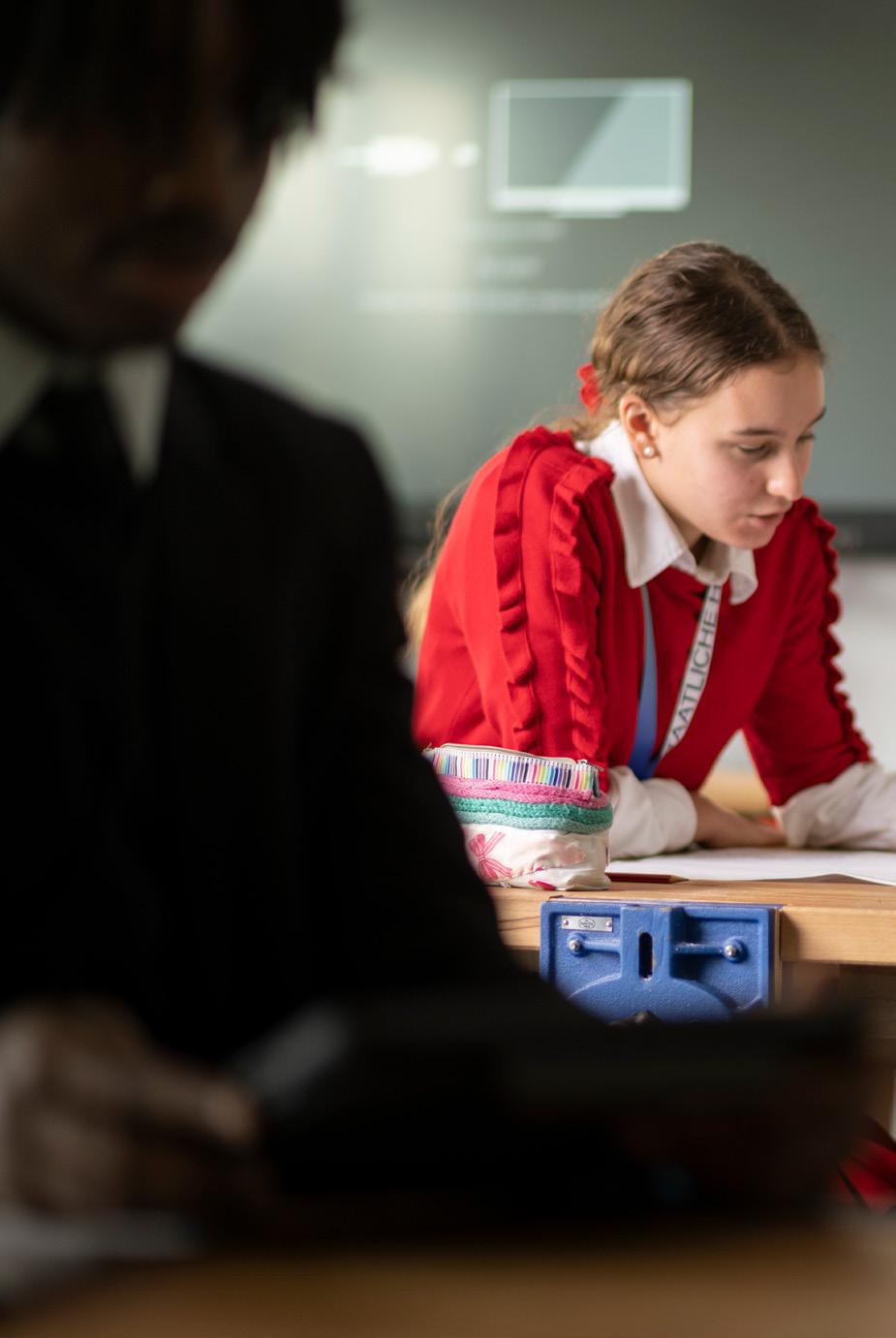
● Leadership & mentoring of Forder Societies in conjunction with Departments as standard for all students from day one
● Running and organising clubs and societies that fit your interests
● Prefecture, taking in 23 posts, and a host of College-wide responsibilities
● College Parliament, shaping and driving the student voice
● Heads of the House system
● Form presentations and assemblies for our Usherwood pastoral programme and Stuart additional curriculum
● Diploma Scholars’ Projects and Symposium
● Independent Learning
● CCF, Duke of Edinburgh and Sporting Captaincy
● Drama, Music & Performance leads
● Charity, Community & Volunteering
● St Dunstan’s Diapason champions
● Aside from these chosen activities, there is a Diploma Scholarship group on entry to the Sixth Form. This can be applied for in Michaelmas term of Year 11.
Prefecture The role of Prefecture in the final year of a Dunstonian’s Sixth Form career undoubtedly carries great prestige and responsibility.
The full team of 23 prefects meet with the Head of Sixth Form and the Deputy Head, Pastoral on a weekly basis, with our six Red Tie Prefects meeting fortnightly with the Head to provide clear guidance and feedback as to the needs of the wider student body as the leaders of our College Parliament. Prefects also have strategic and operational responsibilities to support the smooth running of the College.

A programme of careers and higher education events are held throughout the Sixth Form, designed to give insight into a full range of possible careers and higher education pathways. Specialists provide students with invaluable information in fields of Art Foundation and Drama Schools; Law, Medicine & Vet Science (known here as ‘The Galen Programme’); Politics, Philosophy & Economics; Music Conservatories, etc. We also thoroughly prepare for Oxford and Cambridge selection with success. Through Year 12 students can take part in our Futures pathways, collectively called ‘Aiming High’. Each route contains taught undergraduate level material that helps broaden academic horizons, builds guided personal statement projects, and where appropriate, initiates marked admissions test practice. These bespoke courses ensure applications for competitive degrees are robust and strong. During Lent term of Year 12, for the whole cohort, the UCAS application process is introduced to parents and students, launched with an evening event with guest speakers from university admissions teams, offering insider guidance on personal statements. A panel of alumni also offer feedback on their own universities, to help students understand the type of institution they would like to apply to. In addition, specialist speakers on gap years and overseas applications, are available for one-to-one advice throughout a student’s time in the Sixth Form. In the Year 12 Trinity term, students construct their UCAS application and begin in earnest their personal statement, having the lion’s share completed before the summer break. Through Year 13 Michaelmas term, the ’Aiming High’ programmes with early application dates intensify the preparation given to students for their admissions tests, including personal statements and interviews by their tutors, and our expert Oxbridge and Galen programme co-ordinators. We also host a careers convention at this time, with over 60 exhibitors, plus further Career Insight events through Lent term, each with a panel of professionals giving detailed advice on breaking into different industries. These events are coupled with our visiting Career Mentors, professionals who hold one-to-one meetings with students, so students can get continual feedback and progression advice on how to access competitive careers.
Ms Redding studied Classics at St John’s College, Oxford, before starting her career in education in pastoral care and subsequently training as an English teacher. She has extensive experience guiding students through applying to university, including overseeing the Oxbridge application process for a wide range of subjects and preparation for the TSA, LNAT and other admissions tests. Ms Redding has also assisted students in securing placements in other highly competitive courses including veterinary science, dentistry, and medicine, for which she has guided students through interview and BMAT/ UCAT preparation. She has experience giving advice about a range of post-secondary options, enabling students to make informed decisions tailored to their individual aspirations, including selecting and applying for prestigious apprenticeships with top employers across the UK.
‘Aiming High’ Oxbridge & Competitive Universities Support Programme
Mentored by the Oxbridge Coordinators (STEM & HUMS) and Head of Sixth Form, The Academic Union is a programme of student-led seminar discussions focusing on thought-provoking topics. Throughout the programme, students are encouraged to think out loud, answer difficult questions, and be open to new perspectives; through this they gain confidence in their public speaking skills and ability to effectively explain their thought processes to a wider audience. Students are mentored to present to the group on a topic of their choosing and receive individualised guidance from subject experts. Topics previously explored at such seminars include:
● Could an AI attain consciousness and, if so, what rights would it have?
● Should poetry be difficult to understand?
● How far does populism affect our politicians?
During these two weeks of one-to-one meetings with the Sixth Form Team, students begin to choose their post St Dunstan’s College trajectory, often narrowing to 3 A Levels at this point to better match university offers, and to decide on a Futures Pathway, i.e., one of our yearlong, preparatory courses commencing in the Lent Term (February). These weeks culminate with a student and parent evening event about Futures Pathways, to ensure all parties are aware of the expectations of students, and how the College enables them throughout the application process.
During Lent of Year 12 our Oxbridge Coordinators for STEM subjects and for the Humanities subjects lead weekly courses to develop students’ understanding of the pathway to Oxford, Cambridge or the top tier London universities that require further testing over and above the UCAS application itself. This includes the particulars of the courses on offer, the College system, and the application process. In parallel, students collaborate to explore their subject interests through wider reading and activities which sharpen their picture of what university courses entail. The Oxbridge colleges and their entry statistics are looked at in detail during this period. Students are supported to make an optimal choice of college and subject, considering likelihood of admission in addition to qualities of social and academic life. By Trinity of Year 12, the preparation series is the mechanism to spur students’ further reading, lectures, and projects, to ensure they stand out above other applicants in their subject. The weekly meetings are guided by the slogan ‘what have you read this week?’ and foster a high level of academic reading and oracy throughout the group. Most Oxbridge courses set additional admissions tests, the syllabuses for which have been covered in class by this stage in the year. Students begin preparing for these in earnest, firstly by seeing modelled examples, and then by completing past tests which are marked with detailed feedback by the Oxbridge lead in each department. As well as the application guidance from the Oxbridge Coordinator, each student has a subject-specific mentor to ensure that their personal statement credibly conveys both aptitude and love for their subject. Applicants are sent into the summer break with an Oxbridge Summer Passport, a comprehensive and individualised plan of actions to complete, launching them purposefully into the final intensive preparation period to maximise their chances of success.
Dr Alastair Currie, our Oxbridge Mentor for STEM, studied Natural Sciences at Trinity College, Cambridge including an exchange year at MIT. He completed a PhD in Particle Physics at Imperial, followed by several years of postdoctoral work building and running underground detectors to search for galactic dark matter. Dr Currie has taught and mentored many undergraduate and postgraduate students, specialising in statistical and computational problems in experimental physics. For more information, please email acurrie@stdunstans.org.uk.
Miss Ella Tournes is our Oxbridge Mentor for Humanities, Arts, Languages. She read English Language and Literature at Christ Church, University of Oxford, specialising in Shakespeare and Early Modern Drama for most of her final year. At university she took on the voluntary role of Admissions Subject Representative, mentoring A Level students through each stage of their Oxford applications. Miss Tournes has comprehensive, recent experience of the Oxbridge Admissions process: as a prospective undergraduate herself, as a voluntary facilitator for the University of Oxford, and as a Teacher of English who has mentored students through every stage of their Oxbridge application journey, across a wide range of subjects. For further information, please email etournes@stdunstans.org.uk
“The support was brilliant. They were so accommodating with the fact that it was a very packed application, you are going to need to do a lot and it’s going to take up a lot of time, but they were just so lovely with it and they were always available to help, provide their opinion, help with interview practice and personal statement proofing”
These pathways offer an exciting programme of teacherled seminars, discussing medical & legal ethics, science in medicine, the preparation of arts portfolios for Conservatoires, Academies and Schools, observing law in action, and showing how best to prepare for an application to medicine, dentistry, veterinary science, law, and the political and economic sciences. You will be supported to prepare for all tests and performances, such as the BMAT & LNAT and work experience and interviews.
Selena, Year 13 studentAiming High: The Galen Vet & Medicine Programme, Art, Drama, Music, Law, & PPE Seminars
The three strands of the Diploma – Knowledge, Character, Futures – are underwritten by our Diploma Research Programme. This is taught in weekly lessons by tutors and incorporates the chance to deepen study skills, devising projects and societies, developing personal interests and skill sets. Through it, students could opt to take the Extended Project Qualification, allowing a formally assessed qualification to be gained that can help with entry to certain university courses. Alternatively, students may decide not to take it formally but will still incorporate those skills in their A Levels. At that point (usually after a term’s work) we provide multiple other smaller courses they can take up.
For example:
• Massive Open Online Courses (Future Learn)
• Ab Initio Language Study (Rosetta Stone)
• First Aid Qualification
• Practical Skills Courses (recent examples include barista training, and British Sign Language)
In these ways we are able to build a successful and forwardlooking programme that enables a fully rounded student capable of facing their adult futures with confidence.
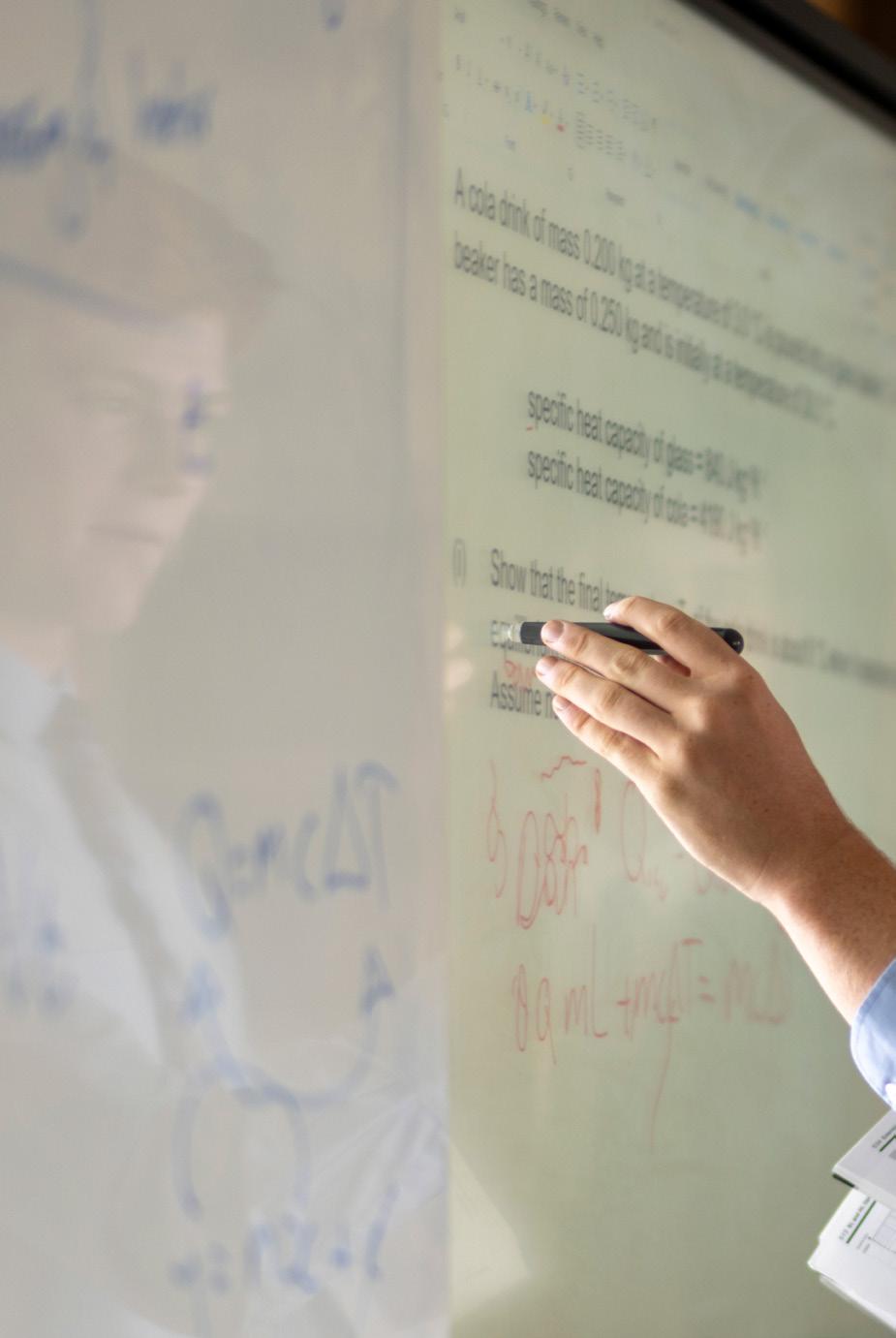

I have been at St Dunstan’s since year 7 and although I considered moving to another school for sixth form, I decided to stay on because of the brilliant opportunities on offer here. I was very happy at this school – and looking forward to the perks of free periods, a fancy café and lots of fun with my friends. Looking back now, I realise I had no idea how great the opportunities on offer were. The St Dunstan’s Diploma has been a major opportunity in so many ways, allowing me to develop my personal interests way beyond the A Level curriculum and grow in confidence as an individual.
I chose to study History, Geography and Religion, Philosophy and Ethics, three essay-based subjects which influenced my extra-curricular choices. As part of my Global Perspectives course (now become the EPQ), I undertook an independent research project on whether the West should pay reparations for slavery and colonialism. This inspired me to explore the role of colonialism in more depth and, for my Scholar’s Project, I examined the role that Muslim, Hindu and British political influence played in the division of the Indian sub-continent. This gave me a greater insight into the links between British imperial policy and relations between Muslim and Hindu political groups.
I have also joined societies as part of the Diploma. At Geography Society, I enjoyed exploring articles which helped me connect geographic concepts to real-life problems. At history society, I discussed the autobiography of Frederick Douglass, a former slave who campaigned for the abolition of slavery. Finally, having the opportunity to be a prefect has shown me the value of student voice and the positive impact we can have as a student body. I have really enjoyed working closely with year 10 as the Red Tie prefect for their year group. This involved organising and running their weekly student parliament. Although I did not look forward to these meetings at the start because the students could be a little rowdy, by the end, I felt really proud to see how much the quality of their contributions had improved, through my leadership and coaching.
My journey from year 7 to 13 has had its ups and downs, as anyone’s journey through secondary school does. The St Dunstan’s Diploma has definitely been a highlight. It has given me amazing opportunities to dive deeply into topics that I find fascinating and also come out of my comfort zone, to take on challenging leadership roles that I might otherwise have shied away from. In many ways, the Diploma journey reflects the St Dunstan’s community – warm and welcoming yet also challenging us to broaden our horizons. I am enormously grateful to all my teachers, my friends and everyone who has supported me on my St Dunstan’s Diploma journey. You have given me a very firm foundation for the next stages of my education and life and I feel excited and well prepared for what lies ahead.

Midway through my schooling, the Director of Music, Mr Oldfield, told me I was going to start taking drum lessons as I didn’t want to sing for my GCSE music performance. I never realised taking lessons up within school would open up so many opportunities for me in Sixth Form.
You could say my subject choices of Economics, Maths and Psychology don’t really show any link to a passion for drums, but I guess that just gives further credit to the school for being able to offer so much, whilst still maintaining my academic focus. I’ve been able to play in ensembles like Big Band, which have opened up my exposure to playing Jazz - not my personal favourite but enjoyable anyway! I’ve also been involved in other musical groups such as recently the band for the musical. It is very clear to me that my experience in school has led to me growing in confidence. One clear memory for me is having to perform in front of the school. I remember uncontrollably shaking an hour beforehand, but I think about how I’ve grown in this area of confidence.
I have also had opportunities academically. Last year, I spent my summer researching for a Global Perspectives research report (an EPQ equivalent). My topic was to see the extent to which social media impacts young people’s mental health. This was a great opportunity as the topic is very much based upon Psychology, the course I will be studying at university, and it has broadened my knowledge outside of what may only be on the syllabus.
So, to conclude, from the highs of performing in front of hundreds of people, to the other joys watching my academic development strengthen, I have become more confident in my abilities, skills I know will serve me well in later life.
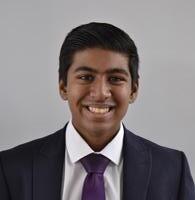
The Diploma has been specifically designed to reflect the full range and diversity of the St Dunstan’s Sixth Form. It adapts to best serve Sixth Formers and, as the following grid structure makes clear, this is a course of many possible pathways, guided with careful expert mentoring, that allows a student’s talents to flourish and grow.
Minimum commitment: 2 Subject A Levels, 1 Extended Project Qualification & 20 hours of Futures courses; two terms of participation in leadership of societies over the two years. Or 3 A Levels, 20 hours of Futures courses; two terms of participation in leadership of societies over the two years.
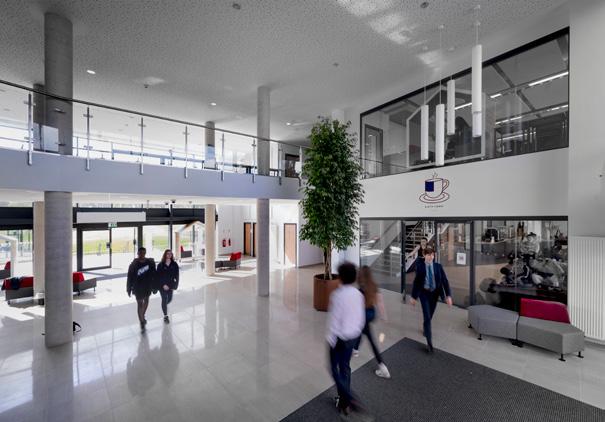
Maximum commitment: 4 Subject A Levels; 1 Extended Project Qualification; 30+ hours of Futures courses; Leadership of multiple groups, covering different fields over the two years.
The Diploma will be awarded to Sixth formers in Year 13 in a graduation ceremony at the end of their last full academic term with us, with their parents invited to attend. We will recognise different levels of achievement in the Diploma at the end of Y13, thus:
Merit:
• A Levels
• 20 hours of guided Futures courses
• 2 Terms of participation in Leader group societies over the two years
Distinction:
• A Levels
• 30 hours of guided Futures courses
• 3 Terms as leaders of multi-year groups over the two years
Honours:
• A Levels
• 30+ hours of guided Futures courses
• 4 Terms as Leaders in Forder or multiyear groups, or as a Leader of a whole school project of extraordinary impact across the year groups
Through this Diploma, the College’s motto of ‘Albam Exorna’, the white shield representing the space for the individual path of each student’s journey, is finally theirs to complete and crown, with an attendant real sense of achievement that comes with this ownership.
This diagram shows the Diploma’s full range of flexibility and choice:
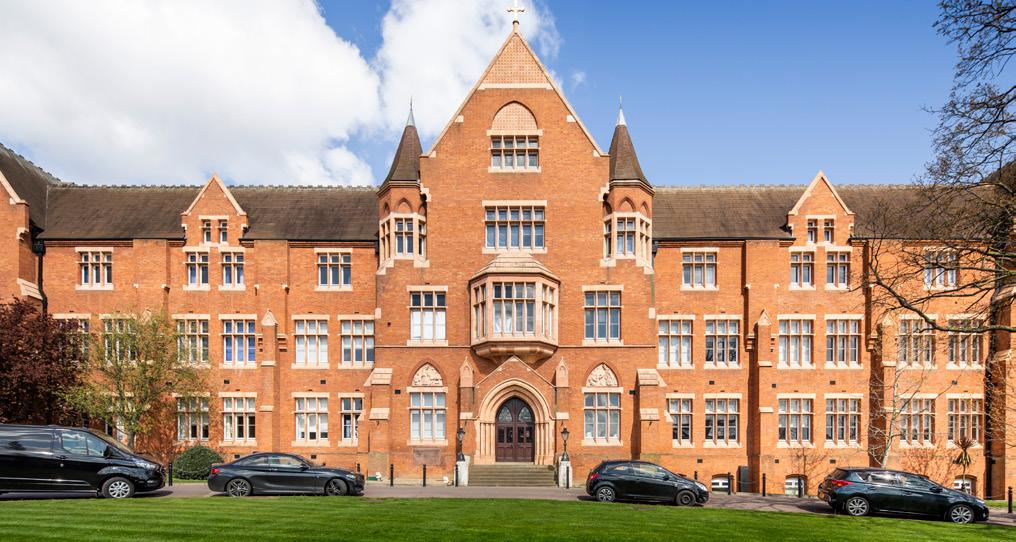
St Dunstan’s College is ideally positioned: within 15 minutes by train from London Bridge or Charing Cross, it is set in 40 acres of land across two sites, accessible within walking distance. Our magnificent historic buildings, dating back to our 1888 foundation, sit comfortably alongside the most recent 21st century developments.
The Great Hall of St Dunstan’s is the physical and symbolic heart of the College. It has had extensive renovation in recent years including a new organ, sound and lighting system. The Great Hall serves multiple purposes for our College and wider community, hosting regular assemblies, events, musicals and plays. It is also the home to the permanent memorial to the hundreds of Dunstonians who lost their lives in the Great Wars. The magnificent stained glass, depicting the varied life of St Dunstan, is a wonderful focal point for our work at the College.

heuristic education, designing the college to have science laboratories for students to discover learning themselves. St Dunstan’s was one of the first schools in the country to have laboratories and to devote significant time to hands-on scientific practical experiments for students to innovate and ‘do’, rather than passively observe. In September 2021, the doors opened to our £25million STEM Centre for Excellence and Innovation, which is home to our Science (Biology, Chemistry, Physics), Design Engineering and Mathematics departments. This includes 12 stateof-the-art laboratories across two floors, engineering workshops with laser cutters and 3D printers, and mathematics classrooms. Our STEM Centre is connected to the Junior School with a stunning glass atrium.
Sixth Form Centre and Café
day during school hours and offers a variety of food and drink including paninis, fruit bowls and smoothies.
In March 2022, our Performing Arts Centre was officially opened. Drama, Music and the Performing Arts are highly valued at St Dunstan’s College and we are fortunate to work with an enthusiastic, committed and ambitious student body. Our Performing Arts Centre is home to all three departments and features large studios, practice rooms, LAMDA spaces and a MAC classroom for musical tech. The Performing Arts Centre also is home to our 170-seat theatre which stages large-scale productions, conferences and community events.
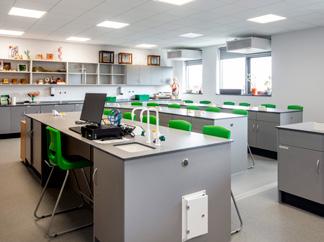
The school’s first head, Charles Maddock Stuart, was a pioneer in
Located inside our STEM Centre, the Sixth Form Centre and Café is the hub of Sixth Form Life. The Centre includes independent learning spaces and meeting pods for students to use throughout the day. Our café, which is exclusively for Sixth Formers & staff, is open every
Juxtaposing new and contemporary thinking with a rich heritage, is at the heart of what makes St Dunstan’s unique. Our Learning Resource Centre fuses the traditional library with digital resources and dedicated collaborative and silent study spaces, as well as facilities for academic enrichment and specialist support.
St Dunstan’s has developed a unique, dedicated facility known as the Wellness Centre, to serve as a hub for student mental and physical health services. The Wellness is home to First Aid and medical support, counselling, peer mentoring, and also features spaces for students to be still and reflect.

crack climb and abseil ledges. The second, donated by the Friends of St Dunstan’s, is a moonboard made for bouldering. It is fitted with an LED system and is fully Bluetooth compatible, allowing students to create their own routes and challenges.
In addition to the facilities contained on our main school site, the College also owns the Jubilee Ground – 23 acres of playing fields in the centre of Catford, a three-minute walk from the College site. Students have access to natural cricket, football and rugby pitches as well as a number of high-quality MUGAs (Multi-use Games Areas) providing opportunities to play hockey, football, and netball.
St Dunstan’s is very proud of its long and prestigious history, but is not constrained by it. Our thriving archives are accessible to students, staff and alumni and supports educational projects, as well as serving a broader nostalgic purpose.

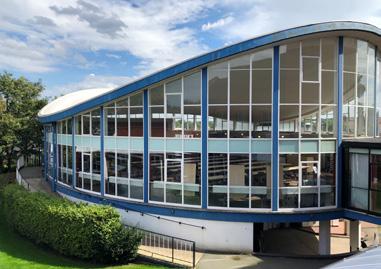
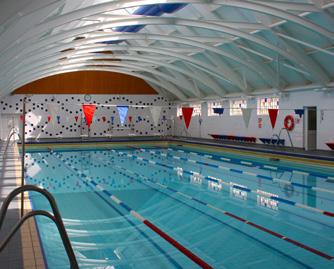
Students have access to a wide range of sporting opportunities across both our sites, both for competitive sport, training and for leisure. Our sporting facilities include two large playing fields on the main College site, a sports hall, gym and fitness studio and a 31 metre indoor swimming pool.
As part of our extensive adventurous training offer, the College has dedicated climbing and bouldering walls. One is a lead climbing wall made from real rock, including
The Senior School ecology pond is located on the top field with breathtaking views of the College site. The pond is used by the Biology Department for outside lessons and is looked after by the Ecology Club who have planted native species hedgerows. The club aims to increase biodiversity on the College site, and the area has been fitted with bird feeders and a camera to watch the area flourish with wildlife.
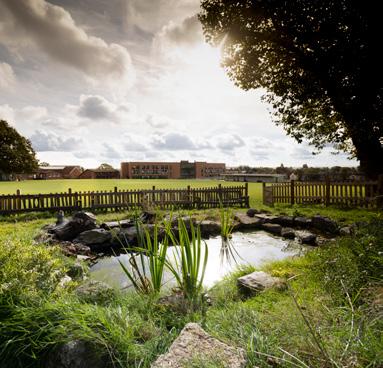
The Plaza, located in the centre of the College site, is a multirecreational outdoor space for students and staff to enjoy. Opened in September 2021, and named by the students, the Plaza is still being developed, with the input of College Parliament. The outdoor space is available for the College community to enjoy throughout the day.
It is with this in mind that our Usherwood pastoral care programme is fully integrated throughout our teaching and learning structure to ensure that we effectively and positively meet the individual personal, social, emotional and academic needs of our sixth form students. We know that strong working relationships between students and the staff who are there to support them and guide them into adulthood are essential and our timetable is structured so that students spend time with their form tutor twice a day. This gives ample time for form tutors and heads of year to develop positive relationships with students, so that they know and understand them
as individuals. This time is used by our form tutors for form activities to build strong relationships between members of the form, and for one-to-one consultations to review students’ progress towards achieving the Sixth Form Diploma. Students also have timetabled sessions for delivery of a knowledge and skills-based pastoral programme which focuses on three areas: well-being, resilience and mental health; understanding neurodiversity; and being a compassionate member of the community, both within school and in the wider world.
Adorning the white means looking to the world beyond the curriculum boundaries, and our freedom as an independent school allows us to devote significant teaching time to the teaching of the whole person.
Our students learn a wide range of strategies for success in our Stuart Curriculum, which is divided into three main strands; relationships; skills for the future; and critical thinking and rhetoric. The relationships strand allows students the opportunity to explore how they interact with others and covers areas such as healthy relationships, sex education, diversity and equality. Within skills for the future students learn financial, domestic and digital skills along with considering their
Year 12
Michaelmas 1 Michaelmas 2
Becoming a Sixth
Former: Values & Community; Presentational & Debating Skills; Study Skills; Community life
Developing the Self: Identity, physical & mental health, career preparation (interviews, CVs, world of work); Sexual Health
Lent 1
Social impact: Community engagement, understanding the political landscape; Building relationships
future career aspirations, developing skills and strategies to support their ambitions. In the critical thinking and rhetoric strand, students develop skills in debating and evaluating reliability of news sources. Students also participate in our Opening Minds lecture series, where experts talk on matters outside our schemes of learning, including such topics as conservation, authoring books and psychotherapy.
Lent 2
Understanding difference: International communities; LGBTQ+; issues around race, sex, violence, neurodiversity; Discrimination
Trinity 1
Love of learning: Academic Project development; resilience; application of revision strategies; critical thinking & debate
Trinity 2
Personal Development & presentations: self-review, critical analysis, creative application; Drugs education
Year 13
Michaelmas 1 Michaelmas 2 Lent 1
Realising potential: University finance, mental health refresher; personal safety; facing the future
Understanding Culture & Society: British values; Multi-national values; bereavement & grief; Moving On
Living independently: Personal finance, internet safety, part-time work, emotional wellbeing
Lent 2 Trinity 1
Preparing for Post-College: Becoming an alumni, race, faith & class at university, dealing with stress, burnout; personal health
Freedom of expression
Tolerating views differing from mine, presenting viewpoints; Summer Ball preparation
Pastoral support is provided constantly throughout the College, in classrooms, during co-curricular activities and in the corridors. However, we are also very proud to have a dedicated Wellness Centre.
The Wellness Centre provides a hub of services, including the College Nurse, first aid and attendance team, the College counsellors, our Peer Mentors and our Youth Mental Health First Aiders. Additionally, the Wellness Centre provides our students with much-needed breakout space; the large, inviting reception area with its caféstyle seating is in near constant use by students during break and lunch times, and during study periods. We know that some young people have needs that cannot be met through school sponsored early support, which is why we have built links with outside agencies and charities, including Lewisham Compass and the South London and Maudsley Hospital, to provide additional specialist support where needed.
Strong, supportive relationships are at the heart of our approach to pastoral care, and further contribute to the sense of community felt around the College. We understand that early identification of need and provision of support is critical to prevent mental illness from developing or worsening; to this end, we have undertaken an ambitious programme of training Youth Mental Health First Aiders amongst our teaching and support staff and Sixth Form students. This nationally accredited training programme ensures that students at St Dunstan’s have a number of educated, caring adults and young people, who can listen to students and signpost them to professional support. We also subscribe to the Wellness Hub by Teen Tips, as an online platform of resources for parents, students & staff.
All students at St Dunstan’s College are supported and challenged throughout their journey in order that they can thrive, and are supported by teachers where there are any individual student needs, be they from an educational, medical, or pastoral background.
Our principle is to ensure that all students are able to thrive within the College, partaking in all that we offer. In the Senior School, there is a dedicated Learning Support Coordinator, overseen by our College Special Educational Needs and Disabilities Coordinator (SENDCo), both of whom work closely with our College Nurse who coordinates our medical register and Individual Healthcare Plans. We also have our Head of Scholars and Deputy Head Academic, who work with our academic departments to ensure students are stretched and challenged through ambitious lessons
and enrichment activities. We communicate regularly with students and parents with any individual pupil need to ensure that our approach is personalised for each context, and to feed into our tailoring of teaching to best include students into the busy life of St Dunstan’s. Our teachers are proud of their inclusive teaching, making purposeful adjustments to their classrooms and activities in line with Learning Support Profiles, Individual Healthcare Plans or other recommended strategies.

St Dunstan’s was re-founded in Catford in 1888, but its origins stretch much further back than this.
Originally positioned next to the now ruined church of St Dunstan’s in the East, the College’s strong connections with the City of London and the parish church of All Hallows by the Tower in particular, go back to the 15th Century. We pride ourselves on being forward thinking, whilst still understanding the importance of remembering our rich history and time-honoured traditions. Events are scheduled throughout the year, which present valuable opportunities for the College community to gather and celebrate. Whether it is our Commemoration Day service at Southwark Cathedral, when we
commission a train to take all staff and pupils to London Bridge; the ancient ‘Beating of the Bounds’ ceremony in the City of London; or our annual service of Remembrance, we remember our historic roots and learn about the foundation of the College. Our year ends on a high with the St Dunstan’s Festival –a two-week celebration of creativity in our diverse community. These events, and others, form the highlights of our College calendar and keep us rooted in the traditions of a community of which we are proud to be a part.
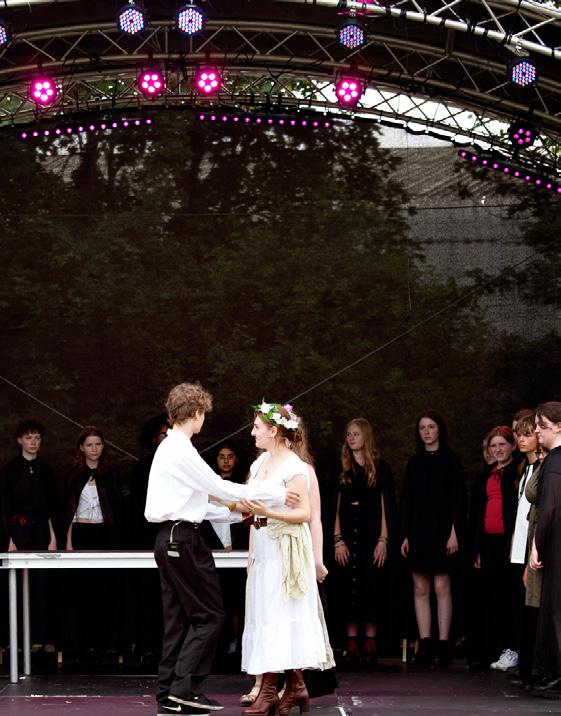
Each year we offer a broad range of trips to students of all ages to support the development of life skills, increase cultural understanding, bring academic subjects to life and create memorable, formative experiences.
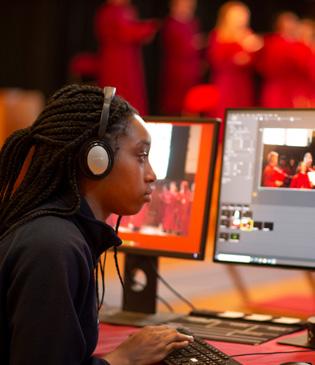
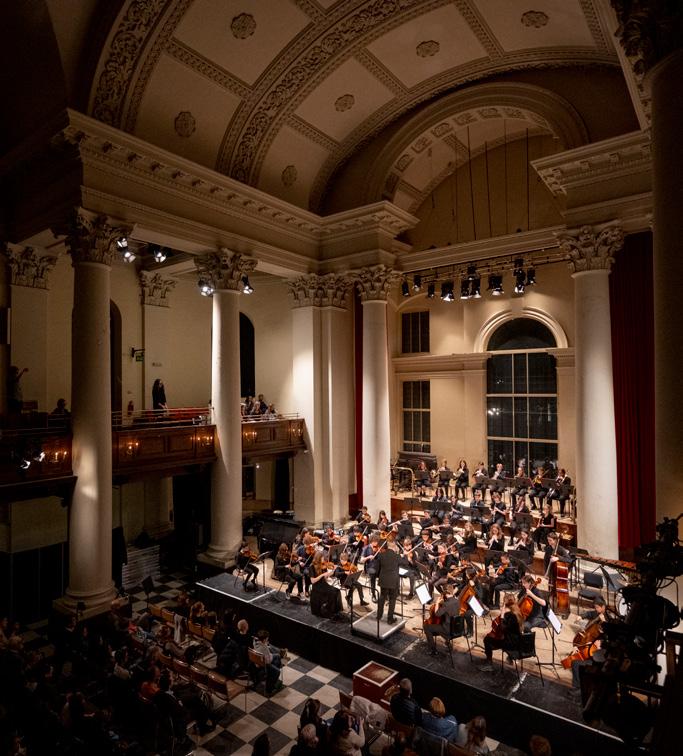
Whilst the nature of these trips varies significantly in terms of size and scope, each one helps our students to develop a true understanding of the world of which they are a part. The Duke of Edinburgh Award and Combined Cadet Force provide students with regular opportunities to get out on adventures and work as part of a team whilst exploring the great outdoors. This sits alongside our Adventurous Training programme which runs regular, smaller-scale adventurous activity expeditions,
such as climbing, mountain biking and kayaking. Our academic departments take every opportunity to bring their subjects to life, and each year we offer an exciting programme of regular day and ‘short-stay’ trips. We are also fortunate to be able to offer students longer and more immersive trips to locations slightly further afield. More recent examples have included a sports tour to South Africa, a Sixth Form-only ski trip and a Geography trip to the Azores.
Mr Alex Brewer
Head of Sixth Form
abrewer@stdunstans.org.uk
Ms C Winder
Head of Year 12 cwinder@stdunstans.org.uk
Ms R Redding
Head of Year 13 & Director of Futures rredding@stdunstans.org.uk
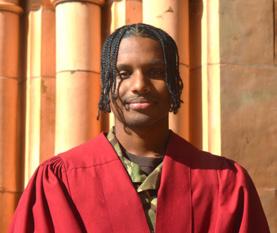
St Dunstan’s always strives to be the most opportunityfilled and inclusive institution possible. Our motto, ‘Albam Exorna’, reminds us to ‘adorn our blank slate’, perfectly encapsulating the passionate attitude shared throughout the school. The Sixth Form is no exception; students are given a vast range of A Level subjects, including the newly introduced A Level Politics. Moreover, thanks to the incredible Forder Programme, students are offered a wide assortment of co-curricular clubs and societies to indulge in new endeavours, unbound by the walls of the classroom. For example, the Combined Cadet Force was excellent at helping me develop my leadership, confidence, and communication skills. Quite simply, the opportunities for students here at St Dunstan’s are limitless.
A high-achieving school such as St Dunstan’s competes frequently in sports fixtures, and in the Sixth Form, we are encouraged to get involved and take leading roles, to set a good example for the younger students in the school. We have weekly fixtures in sports such as netball, hockey, cricket, and football, with our latest achievements being the winners of the Blackheath Cup for the latter. These activities and fixtures provide a great balance with the intense work in the Sixth Form, whilst also granting the opportunity to represent St Dunstan’s against other schools, a very prideful accomplishment. The facilities at St Dunstan’s are nothing short of excellent. Naturally, secondary education brings with it difficult struggles and issues to face, all of which can be quite overwhelming for students. As such, our Wellness Centre is always open to all members of the College, and it aims to improve the student’s physical and mental well-being. Our college nurse is on standby to assist with any injuries, and our fully qualified councillors and Pastoral Team are readily available to help and speak to. We aim to provide this safe space, so students feel comfortable and welcome during their time here at St Dunstan’s. As a student who joined in Year Seven, I have had the privilege of watching this school develop to suit the ever-growing community of St Dunstan’s. One of the most notable changes has been the newly developed STEM building, which has been a huge improvement on the level of work and breadth of engagement in STEM subjects. Not only that but the building is also home to our Sixth Form Centre, where all Sixth Form students
have access to the Café and silent work areas.
Another new inclusion to the school is the Theatre. Having just opened in 2022, the Theatre has been utilised for lectures, performances, and many events. I had the privilege of co-directing a play showcased in the Theatre, and it allows such student-led productions more space and spotlight. Speaking of events, St Dunstan’s never fails to amaze when our Festival is put on; two weeks of a variety of performances and games available to the whole school, there is always something to get involved in. Specifically for Sixth Formers, we also have a bi-annual Ski trip in December, a chance for the Sixth Form to bond as a whole community, whilst hopefully not embarrassing themselves on the snowy slopes! There is also the Sixth Form Ball, which concludes each school year and is a fantastic time for the students to come together to celebrate and reward themselves for a year of hard work. These events are excellent at bringing us all closer, as both internals and externals become an irreplaceable part of our big St Dunstan’s Community.
The support available in the school will always be one of its most outstanding qualities. I have never once felt that I am alone, whether that be due to my friends, form tutor or any teacher in the school. Especially as a Sixth Former, our relationship with our teachers is special; we trust one another; hence we are given a lot more freedom as students. This is seen in our Independent Study Sessions, in which we must take it upon ourselves to complete our work and revision. However, this does not mean the support from our teachers is lost, simply this freedom allows us to take control of our actions and prepares us for the independent aspects of life in the future. This helps to create a productive and healthy A Level experience, ensuring students enjoy their time over this two-year course.
I know that I made the right decision to stay at St Dunstan’s for my Sixth Form, as the opportunities and achievements here are unlike anywhere else.
Rio Head of School 2023-2024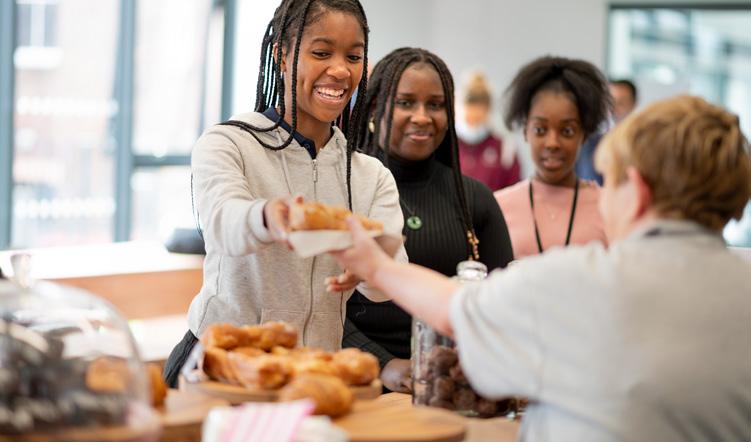
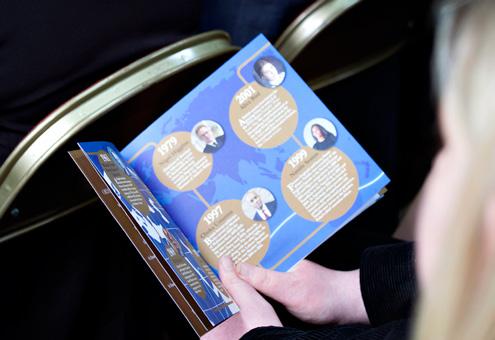

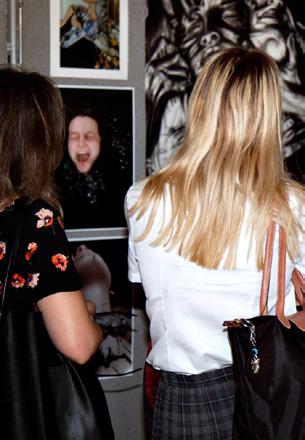
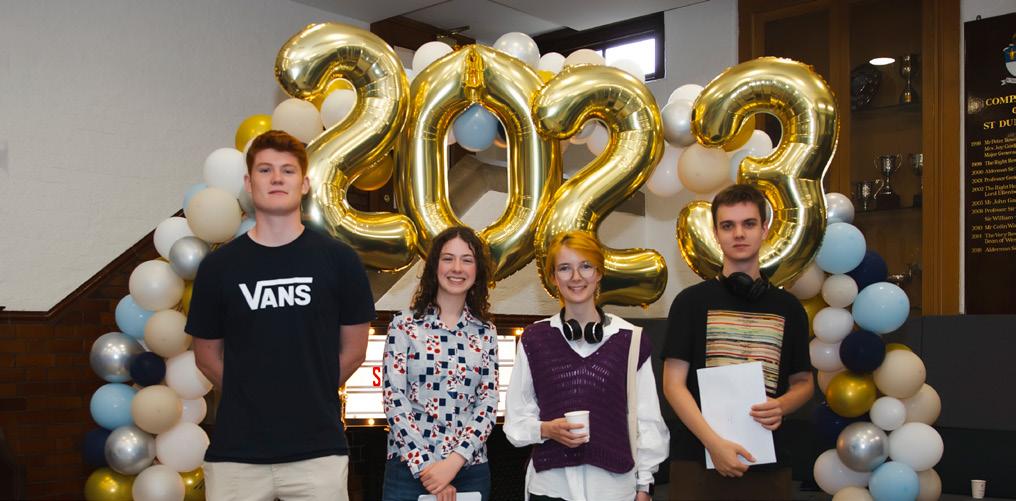
University of Leeds
Film, Photography and Media
Geography
Computer Science
Aeronautical and Aerospace Engineering
Economics and Politics
Economics and Geography
Biochemistry
Criminal Justice and Criminology
Law
International Relations
Philosophy, Politics and Economics
Politics
University of Manchester
Microbiology (4 years MSci)
Environmental Science with Research Placement
Physics
Modern Languages and Business
Management (French 4 years)
Civil Engineering
Mechanical Engineering with Integrated Foundation Year
Criminology
Midwifery
Geography
Economics and Politics
Mathematics
Architecture
Biomedical Sciences
English Language and English Literature
Global Social Challenges Music
University of Liverpool
Architectural Engineering Architecture
Game Design History
Medicine
University of Birmingham
Biological Sciences
Philosophy, Religion and Ethics
International Relations with French (4 years)
Materials Science & Engineering
Swansea University
Classical Civilisation with Year Abroad
Cardiff University
Chemistry
Psychology with Professional
Placement
Archaeology & Ancient History
Computer Science
Music
University of Bristol
Biology
Aerospace Engineering Anthropology
Biochemistry
English
Geography
Philosophy and Theology
University of Bath
Economics with Placement
Psychology with Placement
Computer Systems Engineering
Politics with Economics
University of Exeter
Zoology
Ancient History and Archaeology
Anthropology
History and Politics
Exercise and Sport Sciences
Natural Sciences with International Study
University College London (UCL)
Pharmacy
Mechanical Engineering
Psychology History
University of Southampton
Computer Science
Politics and Economics
Economics and Finance
Geography
Mathematics, Operational Research,
Statistics & Economics (MORSE)
Physics
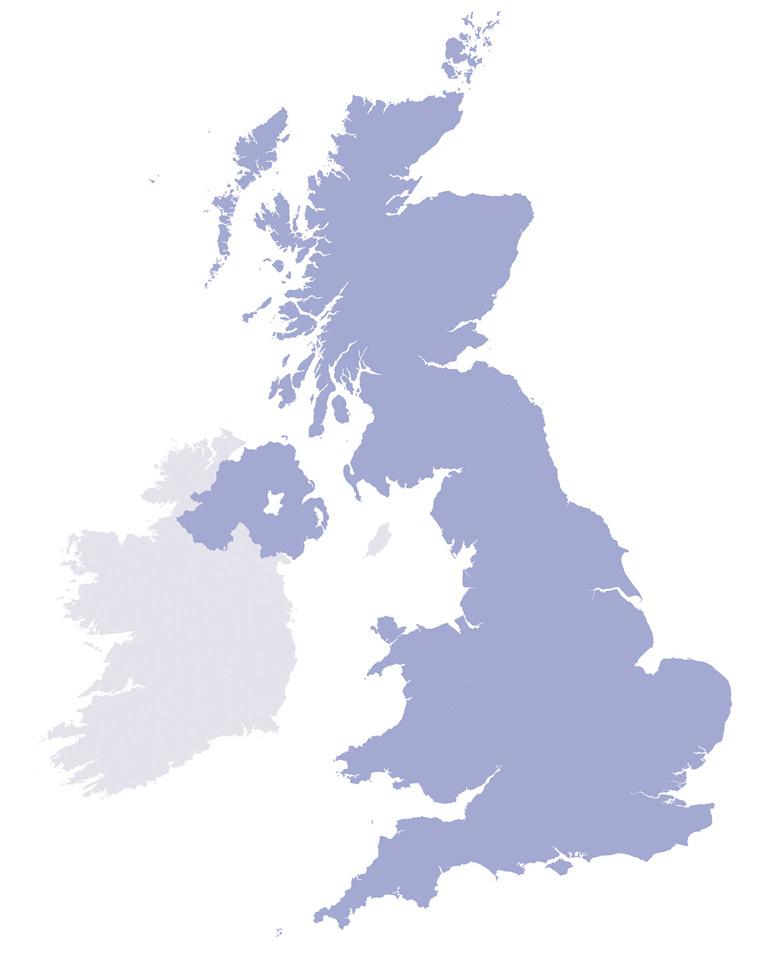
King’s College London
Computer Science
Biomedical Sciences
Classics and the Ancient World
Comparative Literature Political Economy
GL
Loughborough University
Industrial Design
Sport & Exercise Science
International Business
University of Nottingham
Mathematics and Economics
Religion Philosophy and Ethics
Management
Criminology and Sociology
Finance, Accounting and Management with Placement Year
Law
Mechanical Engineering with Industrial Year
Philosophy Philosophy, Politics and Ethics
University of Warwick
Mathematics, Operational Research, Statistics & Economics (MORSE)
Physics with Astrophysics
French and Economics
Economics
University of Cambridge
History
University of Brighton
Biomedical Science
Sport and Exercise Science
University of Sussex
English with Study Year Abroad
Biomedical Science
Computer Science
Social Sciences with Foundation Year
Geography and International Development
International Business with Professional Placement
Finance and Business
Sociology and Cultural Studies
Queen Mary University of London
Computer Science
Biochemistry
English & Drama
Actuarial Science
Physics with Foundation

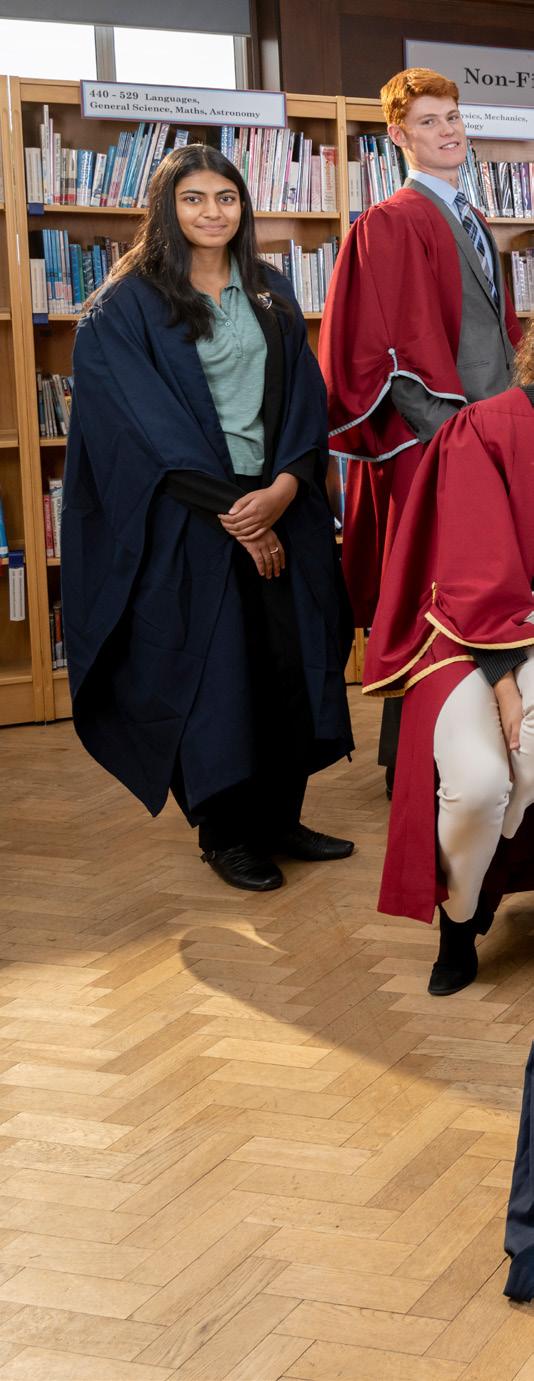
● Art & Design
● Biology
● Business
● Chemistry
● Classical Civilisation
● Computer Science
● Diploma Research Programme
● Design Engineering
● Drama
● Economics
● English Literature
● Further Mathematics
● Geography
● History
● Latin
● Mathematics
● Modern Foreign Languages
● Music
● Physics
● Politics
● Psychology
● Religion, Philosophy and Ethics
● Sport and Exercise Science
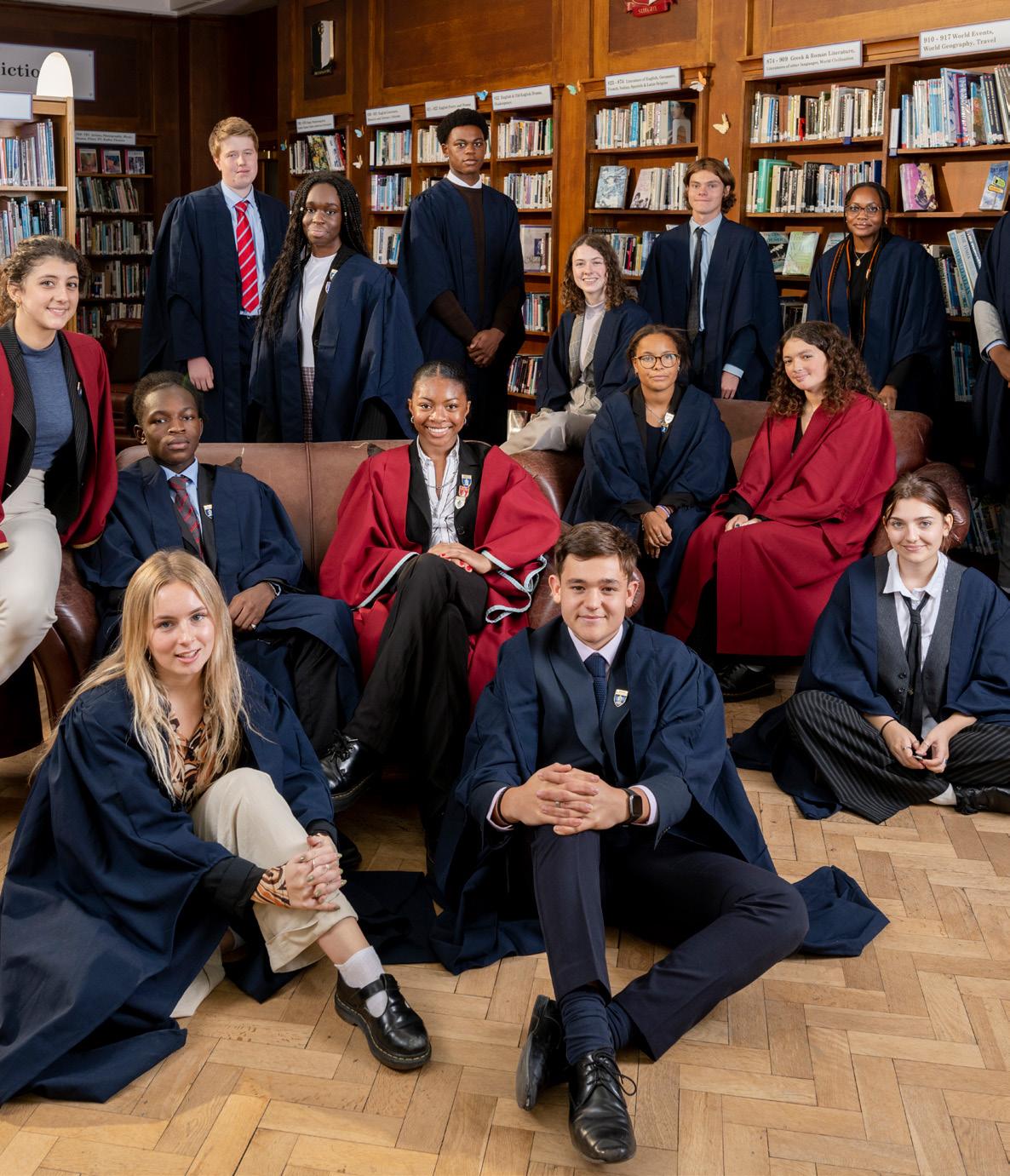
Why study Art? We live in a visually saturated world; the creative industries are booming. Art is the perfect subject to study to develop your creative thinking skills, individuality and technique. A level lesson emphasis is on the ability to think laterally and to convey ideas to aid your progression in any career. Art & Design at SDC prepares you to think and act as an individual, to have clear and thoughtful research, to write and make creatively, and to use a huge array of practical technical skills, all of which make you a flexible and creative problem-solver. At SDC, we prioritise students becoming their own artist. We aim to facilitate student choice and freedom to experiment and try new techniques. Our strength lies within contemporary, conceptually engaging, socially aware art. Small class sizes and strong relationships allow students and teachers to work in an individualised and supported way.
There are two components that make up the course, each with stand alone process work and final outcomes; Component 1: Personal Study, Component 2: Externally Set Exam. Within the Personal Investigation, students work through a series of technique workshops that help them develop different skills and visual language in preparation for their individually chosen Personal Study investigation. The investigation and development of the Personal study will be shown through practical studies and a supporting essay. Students will have opportunities to generate practical work, ideas and research from primary, secondary and contextual sources. They will experiment with media and processes, and develop and refine their ideas, presenting personal and exciting outcomes.
Grade 6 or above in Art and Design GCSE/ IGCSE, or a suitable portfolio of similar standard artwork undertaken over time that meets Department approval if Art GCSE was not taken.
Students may go onto study at Foundation level, followed by degree courses such as Fine Art, Fashion, Architecture, Photography and Graphite Design.
Students submit supporting studies and practical outcome(s) in response to the given theme in the form of a portfolio. Supporting studies will consist of annotation, research and compiled contextual references; practical exploration of material and techniques, recordings from primary sources and developmental stages of practice work leading to refined practical outcome(s).
Personal Investigation – 60% of the qualification.
Part 1 – Personal Investigation: Students submit supporting studies and practical outcome(s).
Part 2 – Personal Study: Students to produce a personal study involving an element of research of 3000 words maximum. The subject(s) explored in the personal study must link to and be informed by their practical supporting studies.
Externally Set Assignment – 40% of qualification.
This represents the culmination of the A Level course. The assignment will be externally set and consist of one broad-based thematic starting point, released on February 1. The delivery of this component is planned with appropriate guidance during the preparatory period, encouraging independence in the development of student ideas, intentions and response. There is a sustained focus period of 15 hours under examination conditions in which students produce their final response(s) to the theme.
• Weekly A Level Clinic and Enrichment Club with one-on-one support and extra workshops.
• Regular gallery and museum visits that allow us to experience London’s culturally rich offer. Recent visits have been to Tate Modern, Royal Academy of Arts, Hayward Gallery, Serpentine Gallery and the Barbican.
• Artist workshops and visits. These have recently included Life Drawing courses, sculpture workshops, and talks on diversity and inclusivity in art.
• Foundation Course application and guidance workshops. These aim to help students develop a portfolio, have interview practice and find the best foundation course for them.
Why study Biology? Students gain an exciting insight into the contemporary world of Biology. The course is academically demanding and covers key concepts of biological science and practical skills are integrated throughout the course. This combination of academic challenge and practical focus ensures the course is pacey and exciting, perfect grounding for those of you thinking about the medical or biological sciences at university.
At St. Dunstan’s we aim to make you a skilled biologist who is able to apply their knowledge to practical work in our state-of-the art labs in our STEM Building. We will challenge you and support you to be the very best you can be!
Biological molecules, cells, and organisms exchange substances with their environment, genetic information, variation and relationships between organisms, energy transfers, organisms responding to changes in their environment, genetics and gene expression.
There is also a strong practical element. AQA has set 12 Required Practicals, but many more are included as part of the course.
GCSE/IGCSE Grade 8 or above in Biology, or 8,8 in Double Science, and a 7 or above in Mathematics. There is an ongoing and considerable need to use mathematics in A Level Biology and students must be confident they will be able to manage this requirement. 20% of the marks across the three A Level papers is awarded for mathematical skills.
Many A Level Biology students go on to read Medicine, Dentistry, Veterinary Science, Biology, Environmental Science, Psychology or Zoology. Career prospects for graduate Biologists are increasing in number: exciting new opportunities are opening up in such areas as molecular genetics and biotechnology. On the other hand, many students who have enjoyed their study of biology go on to successful careers in nonbiological fields, for example in industry and commerce.
All content is examined at the end of the 2 year course:
Paper 1 – Year 1 content. 2 hours. 35% weighting.
Paper 2 – Year 2 content. 2 hours. 35% weighting.
Paper 3 – Years 1 & 2 content. 2 hours. 30% weighting.
• Throughout Year 12 and 13 there are many enrichment opportunities such as a residential Ecology Trip to Flatford Mill, Biology in Action, a conference about topical themes in Biology as well as DNA Fingerprinting at Wakehurst Place. A Level Biologists often choose to attend and lead MedSoc, where they discover more about Medical Ethics and topical themes in Medicine.
Why study Business? If you are interested in the world of business and its innovative and exciting theories and you would like to examine, understand and practise the skills, then this is a fantastic course for you. Whilst studying Business you will apply your knowledge and understanding to real-life business contexts, reflecting on issues impacting on modern businesses and real business case studies. You will develop key transferable skills including numeracy, communication, and an understanding of the business environment and commercial awareness, all of which are highly valued by universities and industry.
At St Dunstan’s we provide students with high academic challenge through exposure and engagement with a range of higher-level texts and guest speakers.
Theme 1: Marketing and people
Theme 2: Managing business activities
Theme 3: Business decisions and strategy
Theme 4: Global business
A Level Business offers an excellent foundation for all business-related subjects at university. It is particularly useful to those wishing to study any of the following: Business Management, Accountancy, Finance and Marketing. Additionally, the skills and knowledge gained through this course prepares students for business, management and financial apprenticeships and the workplace in general. Business is an excellent companion course to almost any A Level profile, providing an understanding of enterprise and development of business ideas.
GCSE/IGCSE grades 6 or above in English Literature or Language and Mathematics.
Paper 1: Marketing, people and global business (9BSO/01)
Questions from themes 1&4, written examination, 2 hours long, 100 marks, 35% of final qualification.
Paper 2: Business activities, decisions and strategy (9BSO/02)
Questions from themes 2&3, written examination, 2 hours long, 100 marks, 35% of final qualification.
Paper 3: Investigating business in a competitive environment (9BSO/03)
Questions from across all themes, prereleased context material in November, written examination, 2 hours long, 100 marks, 30% of final qualification.
• Students will have the opportunity to visit a wide range of businesses, including the Mini factory. The department also invites guest speakers to the College. For example, the IEA and Benjamin Drury aka ‘The Culture Guy’.
• Students will be encouraged to participate in the Student Investor Challenge and various enterprise challenges. This is completed in teams providing an opportunity for students to develop team working skills that are invaluable in a higher education and employment setting.
• We have a lively Economics and Business Society that meets once a week and discusses a wide range of issues. Students are encouraged to select their own topics of interest and lead discussions. Past examples include the impact of Brexit and the business impact of a Biden presidency in the USA.
Why study Chemistry? A Level Chemistry is an exciting course which is academically demanding. Everything you see, touch, taste, or smell, involves Chemistry in some way. As the central science subject, Chemistry fits well with Biology, Physics, and related subjects. Chemists will be needed to help tackle problems facing us such as synthesising the latest wonder drug, finding more environmentally friendly alternatives to plastics and non-renewable fuels, devising better batteries - maybe this will involve you!
At St. Dunstan’s we aim to make you a confident Chemist who is able to apply their knowledge to practical work in our state-of-the art labs in the new STEM Building. We will challenge you and support you to be the very best you can be!
Physical Chemistry: Kinetics, Energetics, Equilibria, Thermodynamics, Electrode potentials.
Inorganic Chemistry: Bonding and Structure, Atomic Structure, Periodicity, The Transition Metals and their reactions.
Organic Chemistry: Alkanes, Alkenes, Halogenoalkanes, Alcohols, Aldehydes and Ketones, Carboxylic acids, Amines, Polymers and Proteins, Organic synthesis, and Modern Analytical Techniques
A Level Chemistry is a necessity for students wishing to go on and study Dentistry, Medicine and Veterinary Science. Students who wish to go on to careers in these fields are support throughout the application process. The subject also lays secure foundation for studying Chemistry, Natural Sciences, Physical Sciences, Engineering or related subjects at university. Students will develop transferable skills such as logical and analytical reasoning, evaluation, data analysis and safe laboratory practice, which are valued by universities.
All content is examined at the end of the 2 year course:
Paper 1 – Advanced Inorganic and Physical Chemistry. 1 hour 45 minutes. 30% weighting.
Paper 2 – Advanced Organic and Physical Chemistry. 1 hour 45 minutes. 30% weighting.
Paper 3 – General and Practical Principles in Chemistry. 2 hours 30 minutes. 40% weighting.
Practical Skills – Students will be assessed on the Common Practical Assessment Criteria across at least 12 practical activities. They will either be given a pass or fail for this element of the course.
GCSE/IGCSE grade 8 or above in Chemistry, or 8,8 in Double Science, and a grade 7 or above in Mathematics. There is an ongoing and considerable need to use mathematics in A Level Chemistry and students must be confident they will be able to manage this requirement. 20% of the marks across the three A Level papers is awarded for mathematical skills.
• MedSoc where Year 12/13 students hone their leadership skills to support Yr 10/11 aspiring medics. The Medics, Dentists and Vets prep course this is a course designed specifically to support Year 12/13 students where they will get a chance to practise their interview skills and prepare their UCAS applications.
• Sixth Form Chemistry Society where students practise challenging questions to prepare them for the Chemistry Olympiad and The Cambridge Chemistry Challenge. Students will also do advanced practicals and talk about Chemistry in the News.
• Trips including to Chemistry Live! where real life working chemists discuss their area of research. Students are able to start getting a flavour of which area of Chemistry they could study at university.
Why study Classical Civilisation? Students have the opportunity to acquire a sophisticated level of knowledge and understanding of the classical world. The course offers you the chance to study elements of the literature, visual/material culture and thought of the classical world; gain an understanding of their social, historical, and cultural contexts. A Level Classical Civilisation will help you to understand the legacy of ancient Greeks and Romans. From women in the ancient world, to the study of religious beliefs and ancient acts of intolerance, Classical Civilisation involves interesting discussions that are directly relevant to today’s world. At St Dunstan’s you will explore the antiquity being guided by the teachers who are totally passionate about their subject. Should you wish, you will be able to teach yourself classical Greek during Forder time.
Component 1: The World of the Hero - This is a compulsory component comprising of an indepth study Homer’s Iliad and Virgil’s Aeneid.
Component Group 2: Culture and the Arts Greek Theatre (21)
Component Group 3: Beliefs and Ideas Politics of the Late Republic (33)
Studying Classical Civilisation at A Level can be very useful. Students not only acquire specific knowledge, but also important transferable skills such as analysing sources and developing independent, critical, and evaluative approaches. They learn to formulate and support an argument and gain a valuable understanding of cultures very different to their own. Classics qualifications are naturally particularly valued by Classics departments in universities. An A Level qualification in Classical Civilisation can support university-level study of Classics, Drama, English, History, History of Art, Philosophy and Politics, however, information from UCAS shows that students who studied Classical Civilisation went on to study in such diverse disciplines as Medicine, Veterinary Science and Chemistry and recently Classics and Theology at Cambridge.
GCSE/IGCSE Classical Civilisation is desirable, but not necessary to study this A Level. Students are expected to have achieved at least a grade 6 in their most relevant GCSE/IGCSE subjects – Classical Civilisation, if taken, or alternatively English or History, for example.
OCR’s A Level in Classical Civilisation consists of three written examinations that are externally assessed.
• Students of Classics have the opportunity to attend the Classical Greek Club and to visit either Greece or Italy on one of the biennial trips organised by the department to explore the exciting sites such as the Bay of Naples, Tivoli and Rome or a trip around Peloponnese, Delphi, Nafplio, and of course Athens.
Why study Computer Science? Computers are everywhere and we are currently living in the Digital Age and while computers solve problems to serve people, there is a significant human side to computer science as well. The most important aspect of studying Computer Science at A Level is problem solving and this essential life skill will be crucial to being able to understand how technology plays a huge part in our daily lives.
At St Dunstan’s, our aim is to inspire and encourage students to step out of their comfort zone and try something new. We don’t just teach the specification; we encourage you to read and study beyond the syllabus. By doing so, you will have a better idea of what industry you want to work in before you get to university. We will give you all the tools you need to be a Computer Scientist – it’s up to you to show us what you can do!
You will be introduced to the internal components of the CPU, software development, data types and legal and ethical issues surrounding technology. Computational thinking and programming will also play a huge role in this course.
The course is assessed with two written papers (worth 80%) on Computer systems and Programming and a final project (worth 20%).
Students will analyse, design, develop, test, evaluate and document a program written in a suitable programming language for their practical project.
The examinations have a range of questions from multiple-choice to short written answers and extended essays.
Grade 7 or above in GCSE/IGCSE
Computer Science and/or a grade 7 or above in Mathematics.
Given the prevalence of computer technology in society today, there are many different career possibilities for those studying Computer Science. Cyber security, software development, engineering, programming, web development and project management are just a few of the many jobs available for those who work in this industry. The right job, however, will depend on your personal skills, values and interests.
• There are several enrichment opportunities throughout Year 12 and 13, including trips to the BETT Conference, HSBC and Credit Suisse. External speakers from Braniac, Cyber Discovery and R3 Blockchain will also give you an insight into their roles and share their expertise on the range of careers in Computer Science.
Why study Diploma Research Programme? Take a global look at the most pressing and urgent questions facing us today. Climate change, artificial intelligence, LGBTQ+ rights, equality in world sport, Black Lives Matters, or honesty in politics can all be on the agenda. Develop your research and analytical skills by learning to spot Fake News and flawed reasoning. Then communicate your ideas with maximum impact.
This is key to the development of a St Dunstan’s student as an independent, curious, forward-thinking global citizen. It also helps to develop core skills students will find useful in their other subjects.
Year 12 Michaelmas term – all students start on the Diploma Research Programme. Skills developed; project management, research techniques, reflective learning, presentation techniques and effective writing skills. They then choose an either Extended Project Qualification (recognised by many universities as helpful for entry to certain courses) or switch to non-examined on-line courses (MOOCs) and/or other practical skills modules.
Students pick a topic that excites them and gives the opportunity to research areas beyond the confines of the A-Level syllabus. The range of possibilities is wide, but for those on an EPQ track the format of outcome can be a dissertation, report, performance or artefact (equivalent to a 5000 word essay). They keep a Production Log to help them reflect on the process and give a final presentation.
EPQ is an AS-Level qualification and carries UCAS points. It helps in the development of academic skills needed at undergraduate level and EPQ students have received lower offers from universities as a result.
The journey is as important as the outcome. Students submit their project (or photographic evidence of it) and the Production Log. It can be a 5000-word essay. If it is an artefact or performance an extended piece of writing of about 1000 words is also needed. They give a presentation reviewing their progress as well as the outcome. These are assessed internally and externally moderated.
Entry requirements
Standard requirements for entry into St Dunstan’s Sixth Form
• EPQ – Each student has a lot of freedom over what topics to cover. As such the course is a springboard to independent research and inquiry into almost anything. They are encouraged to follow their curiosity and delve deeper into what excites them and what they are passionate about studying after school.
Why study Design Technology? Studying A Level Design and Technology develops your problem solving, planning, evaluation, communication and teamwork skills, not to mention being a fantastic forum through which to showcase your creativity. This course covers a wide range of design disciplines, but is firmly rooted in the skills required to design, engineer and manufacture high quality, functional and aesthetically pleasing products.
A Level Design Technology (Product Design) requires students to engage in both practical and theoretical study. This specification requires students to cover design and technology skills and knowledge in the following key areas: technical principles and designing and making principles.
The investigative, analytical, creative and evaluative skills acquired via this course are valuable in their own right and are highly transferable to other areas of study. Students completing A Level Design Technology might consider Product Design, Packaging Design, Architectural Technology, Marketing, Television and Film Set Design, Interior Design, Garden Design, Furniture Design, Automotive Product Design or 3D Digital Modelling and Animation, Engineering. This course also complements other A Level subjects to prepare students for further study and careers in Engineering and Fine Arts.
Public Examination on Technical principles: Written exam: 2 hours and 30 minutes, 30% of Qualification, Mixture of short answer and extended response questions.
Public Examination on Designing and making principles:
Grade 7 or above in GCSE/IGCSE Design Engineering/Technology. Students must have well-developed sketching skills, be computer literate with some experience of graphics software and desktop publishing. Also expected is a grade 6 or above in Mathematics, a Science or Art.
Written exam: 1 hour and 30 minutes, 20% of Qualification, Mixture of short answer and extended response questions.
Non-exam assessment (NEA) – Coursework
Project, 50% of Qualification, Written design portfolio and photographic evidence of prototype.
• We attend the Product Design in Action lecture series in London each year. This series features leading designers from the UK design industry.
Why study Drama? Drama and Theatre Studies A Level study will provide you with an in-depth knowledge about everything that happens on stage: the acting and directing, the set and staging, costumes, lighting, sound and other technical aspects of theatre. You will read and study plays considering not only the text but also the performance and staging of the work. All A Level Drama and Theatre Studies students work as either performers and/or designers on at least three different performances. The focus of Drama at the College remains on creating new work, rather than simply re-imaging or re-interpreting the work of others. We encourage students to work as an ensemble and to focus on creating altruistic opportunities to give back to their local communities. We do not seek to create lead roles or make theatre about the talent of individuals; instead, we choose to focus of the power of ensemble theatre that educates in as much as it entertains. We hope you would like to be part of that vision!
Component 1: Theatre Workshop. Learners participate in the creation, development and performance of a piece of theatre based on a reinterpretation of an extract from a text chosen from a list supplied by WJEC. The piece must be developed using the techniques and working methods of either an influential theatre practitioner or a recognised theatre company. Learners must produce a realisation of the performance or design and a creative log.
Component 2: Learners participate in the creation, development and performance of two pieces of theatre based on a stimulus supplied by WJEC. Learners must realise their performance live for the visiting examiner. Learners choosing design must also give a 5-10 minute presentation of their design to the examiner. Learners produce a process and evaluation report within one week of completion of the practical work.
Component 3: Exam paper based on 3 set texts.
Drama students develop excellent abilities in written and verbal analysis and evaluation, skills which are highly valued by universities and employers. As such, the subject relevance is not limited to supporting performing arts-based future pathways. Nevertheless, in recent years our students have gone to RADA and other drama training institutions. However, for those who do wish to explore drama as a career, there are many professional drama schools (NCDS) offering degree courses. Drama and Theatre Studies is a well-regarded and academic qualification, whether you take it with a view to a career in performance or not.
Component 1 – Devised Theatre (20% of A Level)- Assessed in Year 12
Component 2 – Text Study (40% of A Level)Assessed in Year 13
Component 3 – Written Exam 2hr 30mins (20% of A Level) - Assessed in Year 13
A grade 7 or above in Drama GCSE/ IGCSE and a grade 6 or above in English Literature or Language.
• You will have the opportunity to see a great deal and variety of live theatre around London, as well as the chance to work with a number of professional actors/directors as you study acting techniques in both lessons and through workshops.
Why study Economics? Economics is a subject full of controversy allowing students to consider the topical issues of the day in a lively and analytical way. A Level Economics will give you an excellent understanding of how economies allocate their scarce resources to meet the needs and wants of their citizens. You will develop a greater understanding of the economic problems which face individuals, firms, and governments on a local, national, and global level and the alternative ways these problems can be resolved. You will investigate microeconomic topics such as how individual decisions impact economic outcomes, the importance of competition, how markets operate and why they fail and how the distribution of income and wealth is affected. At the same time, you will learn about macroeconomics, looking at the ‘big picture’ of how our national economy fits into the global context, the global impact of financial markets and monetary policy and the operation of the international economy.
At St Dunstan’s we provide students with academic challenge through exposure and engagement with a range of higher-level texts and guest speakers.
Microeconomics: Individuals, Firms, Markets, and Market Failure:
• Economic methodology and economic principles
• Price determination in a competitive market & elasticities
• Market failure & government intervention
• Production, costs, revenue, profits & market structures
• The labour market & the distribution of income & wealth
Microeconomics: The National and International Economy:
• Objectives of government economic policy
• Circular flow of income & AD/AS
• Demand-side policies & supply-side policies
• Inflation
• Unemployment
• Exchange rate systems & balance of payments
• Financial markets
• Globalisation, trade, and economic development
GCSE/IGCSE grade 7 or above in Mathematics and a grade 6 or above in English Literature or Language.
A Level Economics is excellent preparation for almost any university course and for a wide range of careers in the future. The analytical and evaluative skills students gain are highly valued by universities. While it is obviously very useful to those wishing to study Economics, it is also of great use to prospective Management Science, Humanities, Politics, Philosophy, Law and even Science students.
The course is assessed at the end of Year 13 in 3 separate examinations.
Paper 1: Markets and market failure. Written exam, 2 hours, 80 marks, 33% of final qualification.
Paper 2: National and international economy. Written exam, 2 hours, 80 marks, 33% of final qualification.
Paper 3: Economic principles and issues. Written exam, 80 marks, 33% of final qualification.
• We have a lively Economics and Business Society that meets once a week and discusses a wide range of issues. Students are encouraged to select their own topics of interest and lead discussions.
• The department also invites guest speakers to the College, attends LSE lectures and arranges trips to a wide range of organisations including the Bank of England and the Mini factory near Oxford.
• Students participate in the Student Investor Challenge.
• All students read higher level academic texts such as Nudge and Doughnut Economics.
Why study English Literature? If you are passionate about reading, love examining texts and analysing ideas and language, you will thoroughly enjoy A Level study in English Literature at St Dunstan’s College. You will be guided by knowledgeable and passionate teachers, through the study of a broad selection of both classic and modern texts and have plenty of opportunities to debate and challenge ideas presented in the material and by your classmates. Along the way, you will gain excellent training in analytical thinking and writing as well as being given tailored individual support and challenged to ensure you achieve your maximum academic potential. The critical and analytical skills involved are great preparation for a career in law or the media.
Literary Genres: Tragedy set texts: Aspects of Tragedy (Othello, Death of a Salesman , and Tess of the D’Urbervilles).
Texts and Genres: Elements of Crime set texts: (Atonement, Brighton Rock , and Rime of the Ancient Mariner)
Theory and Independence: Coursework: A module in which students explore literature through a range of critical perspectives resulting in two non-examined assignments. There is also an option for students to produce a piece of recreative writing.
*Please note texts taught are subject to change. Those identified above were taught to our 22/23 cohort.
English Literature helps to develop your ability to handle complex ideas and interpret information in a wider context. It also helps you to develop your planning and research skills, as well as gaining knowledge of history, culture, and philosophy. As well as being a core requirement for the further study of English Literature at degree level, an A Level in English Literature allows you to keep your options open, particularly if you are not sure what you want to study at university and will support application to a wide range of degree courses.
Paper 1: Literary Genres. 2 hours 30 minutes. Closed book.
Paper 2: Texts and Genres. 3 hours. Open book.
Theory and Independence consists of two coursework essays of 1250 – 1500 words each.
GCSE/IGCSE grade 7 or higher in both English Language and English Literature. You must also enjoy reading and discussing texts: a reading list is available from the English Department if you would like to begin preparing in advance.
• Students are welcome to participate in senior debating and take to a leading role in English Society which is an opportunity to read and discuss a diverse range of texts. Students are also welcome to submit articles or creative writing for publication in-our Senior School Magazine.
Why study Further Mathematics? You should study Further Mathematics if you look forward to Mathematics lessons, cannot wait to solve the most complex problems your Mathematics teacher sets you and have a true passion for exploring the subject in far greater depth. In Further Mathematics, you start to explore matrices, imaginary numbers and vectors, and delve into the more analytical areas of Mechanics and Statistics considered too challenging for the standard A Level course.
Studying Further Mathematics at St Dunstan’s College enables you to work with specialists from across the different fields of Mathematics and explore in greater depth the applications and derivations of fascinating, useful and complex concepts.
Pure Core, Further Mechanics, Further Statistics, and Numerical Methods.
Only a small number of Mathematics degrees list Further Mathematics A Level as essential. This is mainly due to the fact that the subject is not offered in all schools or colleges. It is, however, essential to support applications for Mathematics at the most competitive universities and would be highly beneficial to anyone planning to study a course rooted in Mathematics.
The course is assessed by examination only, at the end of Year 13. There are four examinations:
Pure Core: 2 hours 40 minutes
Mechanics Minor: 1 hour 15 minutes
Statistics Minor: 1 hour 15 minutes
Numerical Methods: 1 hour 15 minutes
A grade 8 or above in GCSE/IGCSE Mathematics is required.
• Every A Level Mathematics student takes part in the UKMT Senior Mathematics Challenge in the Michaelmas term. Many of our students qualify for the follow-on rounds. We also enter the UKMT Senior Team Challenge and two of the four Hans Woyda team members are from Years 12 and 13. Advanced Maths Club provides an opportunity to explore areas of Mathematics beyond the scope of the course and gain an insight into the work of famous mathematicians. This club also leads into STEP and MAT practice for those required to sit Mathematics university entrance papers. Chess and Go clubs are available to practise strategic thinking and have some fun at the same time.
Why study Geography? Geography aims to bring together the wide range of ideas that shape the world we live in and explain how we can adapt and work with them. It offers huge variety, is fundamentally contemporary, and links clearly to real world examples and case studies. Geographers are able to combine skills: analysis, data interpretation and fieldwork, combined with the ability to explain your ideas and evaluate them for an audience. Our selected specification offers the best that Geography has to offer with great depth and breadth.
At GCSE, you learned different units and brought them together through the course. The Cambridge Geography course is more like a university-style approach, and allows you to clearly separate your Physical Geography and Human Geography topics. You will have lessons with different specialist teachers, and work towards completing Core and Advanced Options which are all assessed in logical exams at the end of the course. Students should be prepared to be studying across both sides of Geography: some processes, numeracy and data skill is required, together with the ability to synthesise and judge in essay questions.
Geography at university allows you to specialise in your preferred topics, get a real sense of how to connect ideas together, and through extensive fieldwork opportunities culminating in your dissertation. You would be a graduate able to gather ideas, data and then evaluate them, and present them to an audience. Geographers are marketable and employable, and find work in a huge variety of fields: from environmental analysis, oil and gas exploration, climate change research, to careers in banking, law and management consulting.
All assessment is linear and examined: there is no controlled assessment or coursework component. You will sit four exams, each 1 ½ hours long, for each of the topic areas described.
Paper 1: Core Physical Geography, study fluvial geomorphology, atmosphere and weather, and rocks and weathering.
Paper 2: Core Human Geography: study population, migration and settlement dynamics.
Paper 3: Advanced Physical Geography, study hazards and hot arid environments.
Paper 4: Advanced Human Geography, study global interdependence and economic transitions.
A grade 7 in Geography GCSE/IGCSE is required.
• Senior Geography Society offers a seminar-style approach to debating and discussing world issues as well as the option to attend lectures at the Royal Geographical Society and other world class venues. We have local and international field trips – we’ve previously been to both Iceland and Sicily to climb volcanoes and our most recent trip went to the Azores.
Why study History? History is not just about knowledge of the past; it plays a vital role in helping us to understand the present: who we are, where we have come from, the people around us, and the world and societies in which we live. An understanding of History will help you better appreciate different cultures and people, as well as provide a lens through which to analyse current events. You will develop your analytical and reasoning skills. The style of our lessons often follow a similar approach to what a student might expect of a university tutorial—critical discussions of pre-reading, leading to a more informed view of the controversy in question. As such, History A Level at St Dunstan’s is a great way of developing independent learners, critical thinkers and confident oral contributors— all assets as you progress to higher education and the workplace.
Year 12:
The Early Tudors, 1485-1558 (Henry VII – Mary)
The Cold War in Asia, 1945-1993
Year 13:
Civil Rights in the USA, 1865-1992. Coursework on a historical issue of your choice.
History is highly valued academically in its own right and to support other pathways. Other popular degree courses for A Level History students include Politics, International Relations, Law or Joint Honours with Economics or Languages, amongst others. Students can go on to specialise in History - in university departments, as archaeologists, museum curators, librarians, teachers and archivists – but most use it as a means of entry to other professions - the law, politics, journalism, banking, or business.
Early Tudors, 1485-1558 —1 hour 30 exam involving a choice of two essays and a sourcebased essay (25% of the final qualification).
Cold War in Asia, 1945-1993 —1 hour exam involving a 10-mark essay and a 20-mark essay (15% of the final qualification).
Civil Rights in the USA, 1865-1992 - 2 hour 30 minute exam involving a choice of two out of three 25-mark thematic essays and one 30-mark passages question (40% of the final qualification).
Coursework: A 3000-4000 word essay on the Cold War in Asia (20% of the final qualification). You choose an essay from a large range of options that suits your interests or create your own question.
A grade 7 in GCSE/IGCSE History is expected. Students who have not studied History should have a grade 7 in another subject within the humanities (English, RPE, Geography, Classics) to demonstrate their ability to handle source material and communicate ideas through extended writing.
• The Senior History Society provides opportunities to hear (and give!) talks on a range of topics outside of our course content. We run A Level lecture trips and are in the process of organising a Civil Rights trip to the USA in 2023 for both Year 12 and 13. To help students develop independence, we are fortunate to have a wide range of resources available to students through our VLE and the library. Each unit of study also comes with a handy reading list.
Why study Latin? This subject offers you the opportunity to study elements of the language and literature of the Classical world, acquiring in the process understanding of the culture, politics, and social life of Rome at significant periods in its history. At St Dunstan’s, students who choose Latin prove themselves to be completely devoted to the subject, resilient and courageous in tackling the most challenging passages, including the favourites – Scansion and Prose Composition. Teachers from the Classics department are renowned for their passion for the subject and for creating an academically galvanising, immersive, yet friendly and supportive atmosphere in the classroom.
Students build on their knowledge of vocabulary and linguistic structures. They also study two Latin prose literature set texts and two Latin verse literature set texts in depth. Students also study additional literature in translation in order to understand the context from which the set texts have been taken. The prescribed authors for the examinations in 2023 are Cicero Pro Cluentio, Tacitus Annals IV, Virgil Aeneid XII and Ovid Heroides I and VII.
A Level Latin is a prestigious subject which combines well with English, other languages, Mathematics, History, and many other subjects. With a qualification in Latin, you could go on to Higher Education or directly into employment. Higher Education Admissions Tutors and employers prize the transferable skills which the discipline develops, especially analytical and problemsolving skills, intellectual flexibility, and an independent work ethic. It is also a useful subject to support degrees in Classical Studies and Philosophy.
OCR’s A Level in Latin consists of four written examinations that are externally assessed.
Latin Language: Unseen Translation (01). Prose Composition or Comprehension (02). Set text: Prose Literature (03). Prose Verse (04).
A grade 7 or above in GCSE/IGCSE Latin.
• Students of Classics have the opportunity to enrich their language skills in clubs such Classical Greek Club and Latin Poetry. Moreover, they can also visit either Greece or Italy on one of the biennial trips organised by the department.
Why study Mathematics? Students who love studying Mathematics at A Level enjoy the technical nature of the subject and find satisfaction in employing a variety of techniques to find solutions to problems. You should study Mathematics if you enjoy working with algebra, using it to form and solve equations to find the answers to a variety of real-life problems. Mathematicians are particularly interested in how equations relate to graphs and what this means to the world we inhabit, which is something you will be able to explore in greater depth at A Level. You will learn how to tackle a variety of problems using complex mathematical techniques, including calculus. Many employers value applicants who have a qualification in mathematics highly, as they are logical thinkers and excellent problem solvers. The St Dunstan’s College Mathematics department offers unparalleled opportunities to challenge yourself beyond the scope of the course in our cutting-edge Advanced Maths Club. In class, we glean insights from subject specialists across the different Mathematical fields, work together through encouraged class wide collaboration on complex problems and receive extensive support on any topics you find a little challenging.
Core, Mechanics and Statistics.
Mathematics is essential to support applications to study: Actuarial Science, Aeronautical Engineering, Chemical Engineering, Civil Engineering, Economics, Electrical/Electronic Engineering, Engineering (General), Mathematics, Mechanical Engineering, Physics, Statistics
For some universities, especially the most competitive, it is also essential for an application to study: Accountancy, Chemistry, Computer Science, Dentistry, Management Studies, Medicine, Veterinary Science. It is often expected in applications for: Biochemistry, Biomedical Sciences, Environmental Science/Studies, Geology/ Earth Sciences, Materials Science, Optometry, Pharmacy, Physiotherapy, Psychology, Sports Science.
A grade 8 or above in GCSE/IGCSE Mathematics.
The course is assessed by examination only, at the end of Year 13.
There are three 2-hour long examinations:
Core & Mechanics
Core & Statistics
Core & Comprehension
• Every A level Mathematics student takes part in the UKMT Senior Mathematics Challenge in the Michaelmas term. Many of our students qualify for the follow-on rounds. We also enter the UKMT Senior Team Challenge and two of the four Hans Woyda team members are from Years 12 and 13. Advanced Maths Club provides an opportunity to explore areas of Mathematics beyond the scope of the course and gain an insight into the work of famous mathematicians. This club also leads into STEP and MAT practice for those required to sit Mathematics university entrance papers. Chess and Go clubs are available to practise strategic thinking and have some fun at the same time.
Why study a Modern Language? This is an exciting opportunity to gain a deeper linguistic and cultural understanding of French, German and/or Spanish in a dynamic, interactive and fun classroom environment. You will have a chance to study a film and novel/play which has had a profound impact on the culture/people. You will be able to discuss, debate and analyse current issues in the countries where the language studied is spoken. Finally, you will also be able to carry out an Independent Research Project based on your own interests which is excellent preparation for the style of working at university.
A highly valued skill both among top universities and employers, taking a language at A level can open the door to a plethora of incredible opportunities.
What is different at SDC: Students study in small groups ensuring for maximum impact on speaking and listening. Students are provided with bespoke speaking plans run by our Foreign Language Assistants and will have 1-1 sessions each week providing students with the opportunity to develop their speaking skills and to make excellent progress. There are fantastic opportunities to gain leadership experience by running an extra-curricular club related to languages and culture but tailored to your own unique skills and interests.
We have an extremely high ratio of students at St Dunstan’s who decide when they are in Year 13 to peruse a university degree in Languages or Linguistics, or to continue their studies at a university in one of the countries where their chosen language is spoken. This is testament to the to the dynamic and thorough teaching within the MFL department.
The core content is:
1. Social issues and trends
2. Political and artistic culture
3. Grammar
4. Works: the study of literary texts and films
This course offers an excellent foundation for those wishing to study languages and/or a wide range of other subjects at university. It leads naturally to careers in the UK and abroad in the arts and the media, business, finance, law, where fluency in a
foreign language is increasingly valued. Most modular university courses in other disciplines now contain a language element, and many British universities offer the opportunity to study abroad. Graduates in Modern Languages have excellent employment prospects.
Students will sit all their exams at the end of the two year course.
How it’s assessed:
1. Listening/Reading/Translation exercises: 2 hours 30 mins (100 marks, 50% of A Level).
2. Written exam based on the literary texts/film studied: 2 hours (80 marks in total, 20% of A Level).
3. Oral exam: Independent Research Project and stimulus card: 21-23 minutes (60 marks in total, 30% of A Level.
A grade 7 or above in the GCSE/IGCSE of the target language.
• We strongly encourage all students to spend some time in the country of the foreign language they are studying in order to help with language immersion.
• Trips to the Instituto Cervantes, Institut Franςais or the Goethe Institute are organised as well as study days run by the exam board. Work experience abroad is organised through Halsbury and an SDC bursary of £500 is offered to an to outstanding language leader in Year 12 upon application.
• Year 12 students run MFL societies and have further opportunities to develop leadership in languages becoming language ambassadors for the college. The first big event celebrated by the MFL department is the international week of languages in September.
Why study Music? Music is a central life force of human expression, creativity and meaning. It is constantly evolving in its representation and interpretation of a complex and non-binary reality, sound symbolising the ineffable and the uncanny.
This is a contemporary and versatile qualification that offers you the chance to study a wide range of genres, through listening and appraisal, performance and composition. The course values all styles, skills and instruments, and is designed to broaden your mind and foster a love and understanding of all music. You will develop yourself as a performing musician, as well as extending your theoretical understanding of composition and musical analysis. You will also develop your music technology and recording skills.
Component 1: Performing - Students are mentored to formulate and develop an ambitious and varied programme for a public recital to take place in Trinity term of Year 13.
Component 2: Composing - Students learn how to develop their musical ideas and use technology to create compositions that are ambitious and performable. We use Noteflight Logic Pro software.
Component 3: Appraising Music - Students learn to apply specialist terminology to listening extracts and scores of the music, developing their aural, analytical and written skills as well as an understanding of the contextual factors shaping the works. The areas of study include:
• Western Classical Tradition (mandatory)
• A choice of Rock and Pop, Musical Theatre and Jazz areas of study
• A choice of either 20th Century or 21st Century areas of study
A 8 in GCSE/IGCSE Music and be actively learning an instrument or voice at a standard equivalent to Grade 5 at the start of the course. Experience with or a commitment to learning to read musical notation is also essential.
Music is a highly regarded academic subject by universities and employers and students develop wide-ranging and transferable skills, such as aural and written analysis, interpretation of multi-faceted musical data, performance confidence, creativity and facility with technology. The qualification is an excellent foundation for undergraduate Music degrees at university or performance, composition or music production specialisation at Music conservatoires. The transferable skills developed make Music a facilitating subject for pursuing degrees or careers in the Performing Arts, Humanities, Law or Technology.
Component 1: Performing
Option A: Total duration 10-12 minutes (35% of qualification)
Option B: Total duration 6-8 minutes (25% of qualification)
At least one piece must be related to one of the areas of study
Component 2: Composing
Option A: 2 Compositions with a total duration of 4-6 mins (25% of qualification)
Option B: 3 Compositions with a total duration of 8-10 mins (35% of qualification)
Composition 1 is to a brief set by the board in a style that the student has studied.
Composition 2 is a free composition in the student’s chosen style.
Component 1: Appraising Music (40%): Written Exam – 2 hours 15 mins. Students answer a variety of questions relating to the areas of study, these include:
• Set work analysis with score
• Extended responses on wider context
• Unprepared extracts of music with and without a score
• Comparison Questions
• The Music department offers a large range of ensembles and performance opportunities that will develop you as a performer, whatever your instrument or favoured style. Masterclasses and workshops with industry professionals are offered throughout the year in performance and composition. There are frequent trips to concerts in London to enrich understanding. The opening of the exciting new Performing Arts Facility means that students have access to a Recital Room, Recording Studio, Music Tech suite and Practice Rooms to enhance their studies.
Why study Politics? Politicians take decisions that affect our lives, in ways both big and small: whether to introduce public health measures that would curtail individual freedoms; whether the government should reduce spending or pump money into the economy in an economic crisis; how to improve public services like education, the NHS, or policing; and how the can government use policy to tackle environmental issues.
Who makes these decisions and how do they make them? A Level Politics examines how power is exercised in the UK, how institutions like parliament function, and how we as citizens interact with decision makers through representative democracy. Students will also learn the history of key political philosophies that shape decision-making, (for instance considering what it means to have a ‘conservative’ government?), while also examining Global Politics to understand international institutions and put our own example into a broader context.
A Level Politics will give you the skills to cut through the misinformation and be an effective citizen in a twenty-first century democracy.
Political Participation: democracy and participation; political parties; electoral systems; voting behaviour and the media
UK Government: the constitution; parliament; Prime Minister and executive; relationships between the branches
Political ideas: conservatism, liberalism, socialism, feminism
Global Politics: sovereignty and globalisation; global governance: political and economic, human rights and environmental; power and developments; regionalism and the European Union; comparative theories
Students should have a 7 in a humanities subject at GCSE/IGCSE (English, History, Geography, Classics, or RPE).
Politics is a popular choice at university and is regularly combined with other humanities or studied as part of a degree in International Relations. Politics, Philosophy & Economics (PPE) is a highly regarded subject, with History & Politics being another popular route. There are a variety of careers related to Politics, whether in party politics, think tanks and pressure groups, journalism, or the civil service. Politics graduates have skills that are particularly applicable to graduate schemes in consulting and business or for a postgraduate law conversion.
UK Politics, 2 hours (33% of marks): 1 30 mark essay, 30 mark source question, and a 24 mark question on the core political ideas of conservatism, liberalism, and socialism
UK Government 2 hours (33% of marks): 1 30 mark essay, 30 mark source question, and a 24 mark question on feminism
Global Politics, 2 hours (33% of marks): 2 x 12 mark short answers, 2 x 30 mark essays
• There is no subject as dynamic as Politics, where students are expected to be aware of current events and deploy recent examples in their exams. Therefore, students will need to read and watch the political news. Politics Society will give opportunities to explore contemporary issues in greater detail and will invite guests speakers and hold mock elections. Students will have the opportunity to visit the Houses of Parliament and there will be an international trip to Washington D.C. in conjunction with History.
Why study Physics? Physics a fascinating subject that will satisfy the minds of those who are curious about the laws that govern the behaviour of everything from a quark to a red supergiant. It is also a practical subject, so if you learn best from hands-on experience, you will make excellent progress. Studying Physics will develop you as an all-round person, as it requires data handling, Mathematics and ICT, as well as imagination, creativity and communication skills.
At St Dunstan’s College, we ensure that all students have experience of being a practising Physicist. Whether it is writing code for the International Space Station, analysing the LHC data set to find the Higgs Boson, or using an electron microscope to study the structure of ant eyes, we want all students to have felt the excitement of being a scientist over just learning about them.
The course is linear, but broken up into topics that are covered by all students. Topics covered include:
Fundamental particles, quantum mechanics and light, waves, mechanics, Newton’s Laws, work and energy, material properties, electrical circuits, circular motion, simple harmonic motion, gravitational and electric fields, capacitors, magnetic flux, AC, DC and transformers, nuclear physics, radioactivity, astrophysics.
There is also a strong practical element. AQA has set 12 Required Practicals, but many more are included as part of the course.
A grade 8 in GCSE/IGCSE Physics, or 8,8 in Double Science, and a grade 7 in Mathematics. There is an ongoing and considerable need to use mathematics in A Level Physics and students must be confident they will be able to manage this requirement.
Physics is highly valued by universities and employers. Physicists are in demand in the world of science, but also in banking, finance and any business that values clear, logical thinking. STEM graduates have strong earning potential. St Dunstan’s Physics students have gone on to read any of the following: Physics, Natural Sciences, Engineering, Medicine, Computer Science, Economics, Mathematics, Material Science.
There are 3 examinations in the summer of Year 13. Paper 1 & 2 each represent 34% of the total. Paper 3 (worth 32%) covers the option topic, and practical skills and data analysis. All last 2 hours.
The 12 Required Practicals are internally assessed over the two years of the course for a separate qualification, the Practical Endorsement.
• Clubs currently running include; Further Physics to prepare you for Oxbridge Physics and Engineering, and Physics and Maths Society to have a social space for like-minded students.
• Competitions and project undertaken include UK Space Design Competition, Astro Pi and Isaac Physics Senior Physics Challenge.
• Trips have included CERN, the Royal Society, Diamond Synchrotron, and Imperial College.
Why study Psychology? Have you ever wondered why most people conform to social norms? What does it mean to be abnormal? Why do we forget things? How does your relationship with your parents affect future relationships? How is the brain structured?
Psychology is the scientific study of behaviour and the brain. Through evaluation and analysis of scientific theories, the Psychology A Level course will allow you to form your own answers to these questions and more.
To study psychology at St Dunstan’s means to be encouraged to develop independence of thought, where analysis of research studies and theories forms the basis of classroom discussion. With tailored support and frequent exposure to exam material, your essay writing and maths skills will improve, and you will become experts in applying your psychological understanding to the real world.
Psychology is a broad A Level which encompasses a range of different topics, from the effects of society on behaviour to theories of attachment, as well as considering issues and debates in the subject. The course will also provide students with an understanding of how psychological research and analysis is carried out.
Psychology A Level students can go into a vast array of careers which are both directly and indirectly linked to the subject. Typical fields include:
• Clinical Psychology
• Educational Psychology
• Sport Psychology
• Criminology
• Counselling
• Teaching
• Healthcare
Throughout the course students will develop a broad skill set, including effective communication, critical thinking and analytical skills as well as developing literacy and numeracy skills.
The course is entirely assessed by three written papers. All papers are two hours long and each of them contribute equally to the overall A level.
Paper 1 – Introductory Topics in Psychology
Paper 2 – Psychology in Context
Paper 3 – Issues and Options in Psychology
The examinations include a combination of multiple-choice, short answer and extended written answers.
At least 10% of the overall assessment of psychology will contain mathematical skills and all papers require an understanding of the research methods used in psychological studies.
A grade 7 or above in Biology or a grade 7,7 in Double Science. Students should also be confident in data handling and essay writing skills.
• We have a well-attended Psychology Society which gives students an opportunity to develop their engagement in the subject by widening their knowledge beyond the specification.
• Psychology University Prep Forder club has been developed to inform students who are hoping to apply to study psychology at university about career pathways in the field and develop their personal statements.
• The Brain Day run by Dr Guy Sutton is an off-timetable event giving students an opportunity to learn the biopsychology topic beyond the specification, including a brain dissection!
• Guest speakers regularly come into school, for example lecturers from the Freud Museum, psychotherapists, and clinical psychologists.
• We run several trips throughout the year for example to Psychology in Action at the Emmanuel Centre in London.
Why study RPE (Religious Studies)? What is my conscience? Who should decide what is morally right or wrong? What is actually true? Who should decide when to end a life? How can people believe in God in the face of natural evil? How can we ever use language to describe anything? If you want to consider age old questions together with ones that divide the modern world, then Religion, Philosophy, and Ethics (Religious Studies) is ideal! It is a liberal, academic course that gives a foundation in modern philosophical thinking. We explore religious, atheist, moral, and scientific thought, the implications for the future, and there is plenty of room for free discussion.
Unique to RPE A Level, students will benefit from the combined expertise of three separate teachers taking one of each of the three strands: Philosophy, Ethics, and Religion.
Philosophy and Ethics – Topics include: How to argue from logic and from experience. The use of analogy in philosophy and the concept of evil, religious experiences, miracles and their critique as sociological/ psychological/religious phenomena, the ‘self’, the concept of ‘death’ and the humanistic need for an afterlife, behaviour theories, abortion, voluntary/involuntary/nonvoluntary euthanasia, assisted dying, embryo research, cloning, ‘designer babies’, animals as organ transplants for humans.
Religion – Topics include: Christianity’s relationship with gender, feminist critiques and post-gender concepts of the ‘divine’, celibacy, transgenderism, and homosexuality in contemporary society, and its critique of, by, and through ‘religion’, Christianity versus science; does the progress of one spell the downfall of the other?
Pluralism and the freedom of religion, the place of organised/non-organised religion within a secular society, The use of warfare in religion. Nuclear weapons in contemporary politics.
RPE (Religious Studies) has a multi-disciplinary appeal which is highly valued by universities, including Oxbridge and Russell Group. The course helps to sharpen minds and give an individual voice, regardless of future pathways. Philosophy is an asset for anyone who wishes to hone their critical thinking and communication skills, which are highly sought after in business and management, as well as in the arts. Previous students have used RPE to support interests in Medicine, Law, History, English Literature, and PPE. Numbers applying for RPE related degrees is strong, and recent success includes Cambridge, King’s College London, Manchester, Exeter, and other prestigious universities.
2 exams of 3 hours, one on Philosophy and Ethics, the second on Religion and the Dialogue between Philosophy, Ethics, and Religion in contemporary society. There are no coursework elements at A Level.
A grade 7 or above in GCSE/IGCSE Religious Studies is advised. Students may choose the subject not having studied it at GCSE, in which case we would expect at least grade 7 in English Literature or Language and another humanities subject such as History or Geography.
• Since the time of Plato, Philosophy and Ethics have been studied through critical discussion and debate. We continue this tradition, supported by excellent resources and ICT. Our classes are lively, and students engage fully with dialogue and critique. The department has exceptionally wide-ranging books, film, and other media. We run events throughout the year, including trips to lectures. We also plan trips abroad to complement visits of local places of religious, philosophical, or ethical interest.
Why study Physical Education? This practical and engaging course has been designed to allow students to study Physical Education (PE) in an academic setting, enabling them to critically analyse and evaluate their physical performance and apply their experience of practical activity in developing their understanding of the subject. You can explore an activity in detail as a performer, chosen from a wide variety of activities. You will also analyse and evaluate performance in a chosen activity.
The SDC Difference is that we provide opportunities for students to develop both their Academic and Performance Pathways through the study of A-Level PE. The focus of Academic Pathways is for students to enhance their understanding of the key Sport and Exercise Science principles which underpin effective performance in sport while recognising its benefits on Health and Well-Being. Through specialism and specialist input students will develop their Performance Pathways and continue to grow in alignment with Long Term Athlete Development.
Physical factors affecting performance: Applied anatomy and physiology, Exercise physiology, Biomechanics.
Psychological issues affecting performance: Skill acquisition, Sports psychology.
Socio-cultural issues in physical activity and sport:
Sport and society, Contemporary issues in physical activity and sport.
Performance in physical issues: Performance or Coaching, Evaluation and Analysis of Performance for Improvement (EAPI)
The most significant benefits of further study in PE are the opportunities to develop transferable skills that are in demand by further education, Higher Education and employers in all sectors of industry. This specification will create confident, independent thinkers and effective decision makers who can operate effectively as individuals or as part of a team – all skills that will enable them to stand out and effectively promote themselves as they progress through life. This course prepares learners for the further study of PE or sports science courses as well as other related subject areas such as psychology, physiotherapy, sociology and biology.
Exam: Physical factors affecting performance (01) 90 marks, 2 hours, 30%
Exam: Psychological issues affecting performance (02) 60 marks, 1 hour, 20%
Exam: Socio-cultural issues in physical activity and sport (03) 60 marks, 1 hour, 20%
NEA: Performance in physical issues (04) 60 marks, 30%
Components 01, 02 and 03 are exams sat In Year 13. The Performance aspect of Component 04 is assessed continuously throughout the course, and then externally moderated In the Trinity term of Year 13. The EAPI is internally assessed in Lent 2 and then externally moderated along with the Performance in Trinity term.
A grade 7 in either GCSE/IGCSE, or 7,7 in Double Science. It is also essential that you are intending to compete in your chosen sport throughout the course.
• There are a broad range of clubs available within the Sports Department to support students with Component 04. If a student wishes to be assessed in an activity that does not fall within our provision at St Dunstan’s, then they must inform the department as early as possible. Students will attend a revision conference in London in Year 13.

Entry requirements for the Sixth Form are currently set at an average grade score of 6 at GCSE, with some subjects requiring a specific higher grade for entry – please consult subject pages for further information.
Current St Dunstan’s students do not need to complete an application form for Sixth Form entry, but the same GCSE attainment criteria apply for automatic entry into the Sixth Form from Year 11.
Every year we welcome new students from both independent and state schools in the UK, and overseas, into our Sixth Form. Each applicant is considered individually. Our Sixth Form Admissions process involves:
● An online reasoning paper

● An essay question
● Interviews in two chosen A Level subjects
● A general interview with a member of the Sixth Form Team
● A reference from the applicant’s current school
● Assessment in your co-curricular scholarship, if applicable
Offers are conditional on GCSE results (applicants must meet the requirements outlined above). All Sixth Form students follow linear A Level courses and sit public exams at the end of Year 13. We do not enter students for AS examinations in Year 12.
We warmly welcome you to attend our 16+ Open Evening on 3 October 2023 to support your decisions. You will need to book online on our website. You will have the opportunity to meet the Head of Sixth Form, Mr Alex Brewer, as well as various members of the Sixth Form team.
Current St Dunstan’s Year 11 students
Month What
Year 10 November onwards
January-February
May-June
Year 11 September-October
October
November
• Attend our Careers and Higher Education series
• University Programme introduction & various career events
• Pupil and Parents Discovery Tour of the Sixth Form
• Sixth Form Discovery Open Evening
• Oxbridge essay competition launch
• Virtual Q&A with parents and Head of Sixth Form
• Launch of Sixth Form Diploma Scholarship
• Deadline for applying for Sixth Form Diploma
Scholarship
• Diploma Scholarship interviews
• Attend our Careers and Higher Education series
• A Level option deadline
November onwards
December
February
External candidates
• Diploma Academic Scholarship offers
• Acceptance deadline for Sixth Form Diploma
Scholarship offers
• Scholars’ Retreat
Admissions Dates Events
Tuesday 3 October 2023
Friday 20 October 2023
Thursday 2 November 2023
Week commencing 13 November
Week commencing Monday 28 November
Wednesday 6 December 2023
Thursday 21 December 2023
Fees
Sixth Form Experience Evening
Registration Deadline
Assessment Day
Subject and Sixth Form Interviews, Diploma Scholarship Assessments
Offer letters emailed
Post-offer Experience Day
Deadline of Acceptance
Part of the acceptance of a place at St Dunstan’s College is the payment of a deposit of £2,000. This deposit is non-refundable. Fees are reviewed annually by Governors and any increase is kept to an absolute minimum. Fees for the year ahead are confirmed each year at the end of the Lent Term (around Easter time). Fees cover the cost of normal tuition as well as most books and stationery. Costs for lunches and voluntary items such as individual music lessons, are additional. For entry in September 2023, fees are as follows:
£21,321
*Fees for the academic year 2023 - 2024
The bursary programme is designed to help as many candidates as possible, who meet our entry criteria, take up a place at St Dunstan’s. The College offers a number of means-tested awards annually to entrants at Year 12. Bursaries are means-tested in accordance with the criteria published on the College’s website. Both parents are required to provide proof of their income and assets. The level of support varies according to parental need, but can extend to full fee remission in cases of proven need. To qualify for consideration for a bursary, the gross family income must be below £75,000 p.a. Bursaries are always offered for 12 months at a time. The family is required to provide fresh information about its circumstances for every year that their child attends the College.

Levels of support may vary with fluctuations in income. Bursaries are only offered to families who are resident in the UK. The College’s practice is to allocate its entire bursary funding, available for the year, on entry. The College’s expectation is that parents who do not choose to apply for a bursary at the time that their child is being assessed, will not require financial support throughout the time that their child attends the College, except in wholly unforeseen circumstances.
External candidates can apply for a bursary by ticking the relevant box on the online registration form.
Award of a bursary may be subject to a home visit.
The Sixth Form Diploma Scholarship is awarded to outstanding Year 11 students as they embark on their Sixth Form studies at St Dunstan’s College. In addition to excellent academic results, our Diploma Scholars are leaders in the College community and contribute to all aspects of College life. They have an infectious enthusiasm for the subjects and activities they are passionate about, and their work in these fields inspires others to follow in their footsteps. They are able to organise their time to ensure they can meet deadlines and expectations, but always have time to devote to furthering their specialist knowledge or improving their skills. Above all, Sixth Form Diploma Scholars are role models for others in the College, adorning the white of their St Dunstan’s shield with flair and good humour.
Chosen by application and interview with the Head in Michaelmas term of Year 11, Diploma Scholars will be required to lead societies in their favoured disciplines. Working with the Head of Sixth Form and the Director of the Forder programme, and various Heads of Department, scholars are trained in leading seminars, workshops and productions, discussing their work with others to develop new ideas for wider display. This enrichment programme includes off-site visits to lectures and performances, such as to the opera at the ENO, and trips to places of academic and social interest, such as Kew Gardens. We also take the scholars away for a weekend to our Scholars Retreat on the UK coast where they have chance to learn and reflect alongside the Head and with senior members of the Senior School Leadership Team.
In return, scholars are expected to create, advertise and take responsibility for leading at least one student society, for at least two half-terms, in their given field of expertise. They will have mentors who will support the scholars to grow into a champion in their field of expertise across the College and to create an individual scholarship project. There is no standard format for a research project: it can be an essay, a work study, an artistic piece, a video documentary, or a mixture of all or any of these. Projects are presented in the November Scholar Symposium of Year 13 attended by an invited judge and parents.
The Sixth Form Diploma Scholarship may include a fee reduction, but as importantly includes time and mentoring of students to achieve their individual academic potential.
Those internal students already with the College, can apply for a Diploma Scholarship through an interview process with the Headmaster and Head of Sixth Form in November of Year 11. Those applying from outside of the College need to make known their intention to apply for the Diploma Scholarship when they enter the application process. Full details regarding assessment, opportunities and the application forms can be found on our website.
Expectations
The student will excel academically across a range of subjects and hold scores and grade predictions at the highest levels. They will be interested in opening up interesting and unusual fields of interest, going beyond what one might expect of a good GCSE student. They are likely to enjoy discussing ideas and concepts at a higher level of discourse and they will want to lead, create and inspire younger students in their chosen field of ideas.
Expectations
The Art Department looks for young artists who are passionate about the subject through developing their own work, by visiting galleries and museums on a regular basis and through having a range of artistic skills that allow for the demonstration of a high level of creativity. They will lead other year groups in Forder clubs, societies and bespoke artistic projects, including Open Day events and the Summer Festival.

Facilities
● J-Store research base
● 1-2-1 Head of Department mentoring
● Access to the Oxbridge programme
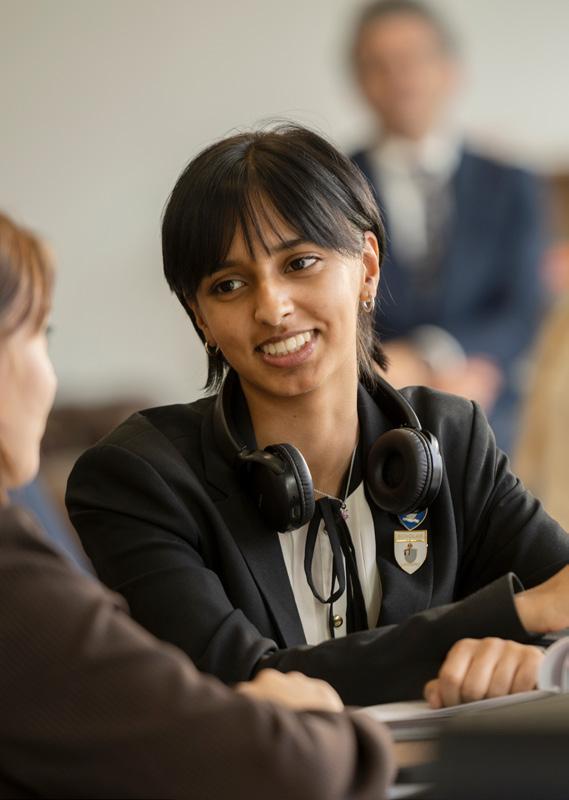
Facilities
● Spacious art rooms
● Kiln
● Photography
● 1-2-1 mentoring
Expectations
Students should have been actively involved in dramatic productions throughout their time in education and be able to depict a passion that goes beyond the classroom. They will lead other year groups in dramatic training and productions, in Forder dramatic arts clubs, at Open Day events and in the Summer Festival. There is no minimum requirement in terms of professional body or amateur group membership but you should be able to verbally depict a passion for the subject with supporting examples of your practice in the field. This field of study may include but is not limited to acting, dance, stage management, costume design, light and sound technician, production management, film or media studies.
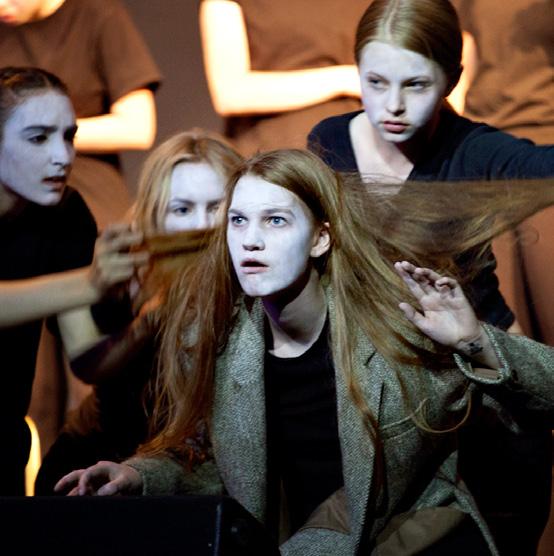
Facilities ● A state-of-the-art theatre
● Practice rooms
● Studios and open spaces for recitals
● Podcast facilities and a tech studio
● 1-2-1 mentoring
Expectations
Candidates are expected to be actively involved in music at their current school as well as outside it (e.g., being part of a choir or orchestra). On receipt of an award, they will become a lead practitioner of music encouraging other year groups via performance and taught music sessions. They will be lead Forder clubs, Open Day events and the Summer Festival. We welcome applications from students having taken ABRSM or Trinity Board exams as well as Suzuki students. Candidates are required to be at a level akin to at least Grade 6 in their main instrument.
Facilities ● A state-of-the-art theatre
● Practice rooms
● Studios and open spaces for recitals
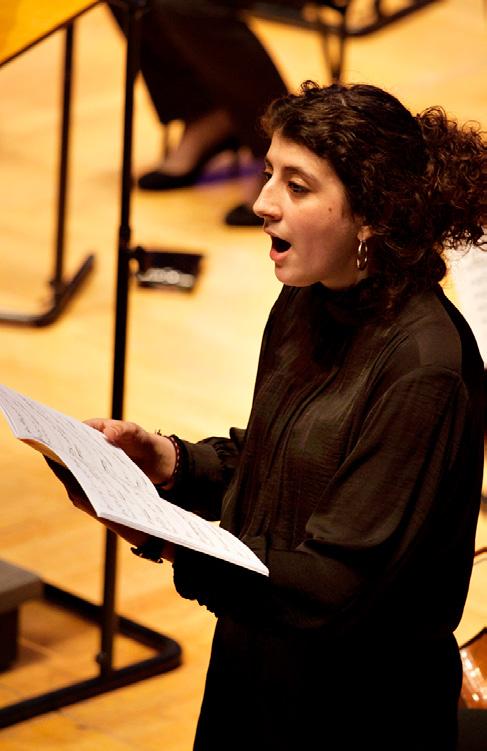
● 1-2-1 mentoring
In addition, the Great Hall, regularly used for events, contains another Grand Piano and an Organ, which are available for students to use.
“The Diploma has really helped me to find new interests, but also to develop things that I was already interested in. I really like the way the Sixth Form is not just focused on the academic lessons; it is also about the elective courses and the Forder Programme.”
Expectations
Candidates should be champions for sport and physical activity in their current school, having demonstrated high levels of commitment and performance in a variety of areas. As a performer, we would expect applicants to be competing at county level or equivalent, depending on the sport they currently participate in. In addition to demonstrating full commitment to our competitive programmes across the Sixth Form, they will train and lead younger years in sporting excellence, particularly in Forder clubs and in team events and matches. They will also be expected to attend Open Days, and to help host the Summer Festival.
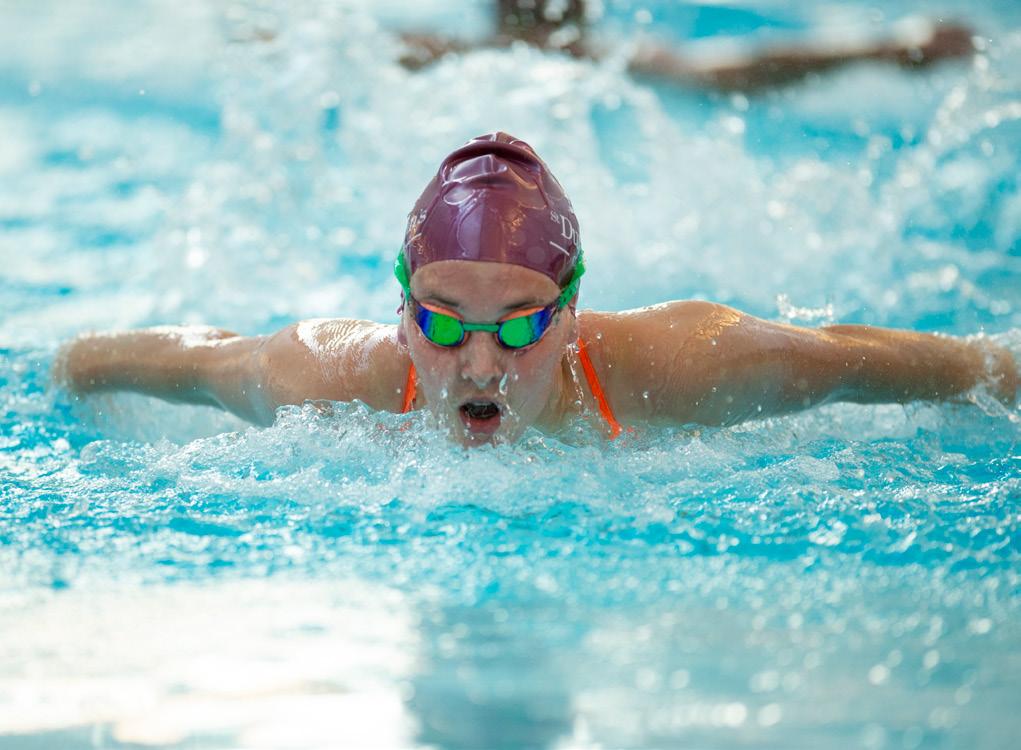
Facilities ● On-site swimming pool
● 10 acres of sport fields
● Multi Use Games Area (MUGA)
● Gym
● Fives courts
● 1-2-1 mentoring
Expectations
The Design Engineering Department is looking for the next generation and Engineers and students with a real passion and aptitude for Design Engineering. Students will be fascinated by how things work and finding modern and practical ways to solve real world problems. They are expected to be subject champions across all year groups and key stages, most directly in running Forder clubs and societies. They will also be expected to lead on Open Days and as part of the Summer Festival.
Facilities ● 3D printer
● Brand new DT classrooms
● 1-2-1 mentoring
Year 12 Michaelmas 1
• All students begin on 4 A Levels plus Extended Project Qualification (EPQ); Tutor groups assigned
• September benchmark test review of subject learning
• Leaders assigned mentors, character-building society membership taken up, Diploma Scholar programme & Aiming High begins
Year 12
Michaelmas 2
• October Benchmark tests: attainment shapes direction of travel & subject support
• UCAS and Unifrog preparation sessions begin; Scholar & academic societies continue
• December consultation week: review of progress, course alterations made, EPQ opted in to AS/A Level, or out of for other Futures courses
Year 12 Lent 1
• Subject learning continues
• UCAS Launch Evening held and individual pathways given more shape
• Diploma Scholars change leads of societies. Scholars assigned mentors to shape projects
• Aiming High decisions about tests & institution pathways taken
Year 12
• February/March Benchmarks are held: final alterations to A Level path finalised
• Benchmark attainment shapes subject support
• Prefecture launched - applications submitted on Trinity return
Year 12
• Prefect applications accepted and interviews held: Prefecture begins
• Preparation for End of Year exams enacted: minimum three CCC grades at A Level by end of the year ensures Y13 will be successful
• UCAS university visits and Aiming High and vocational subject testing underway
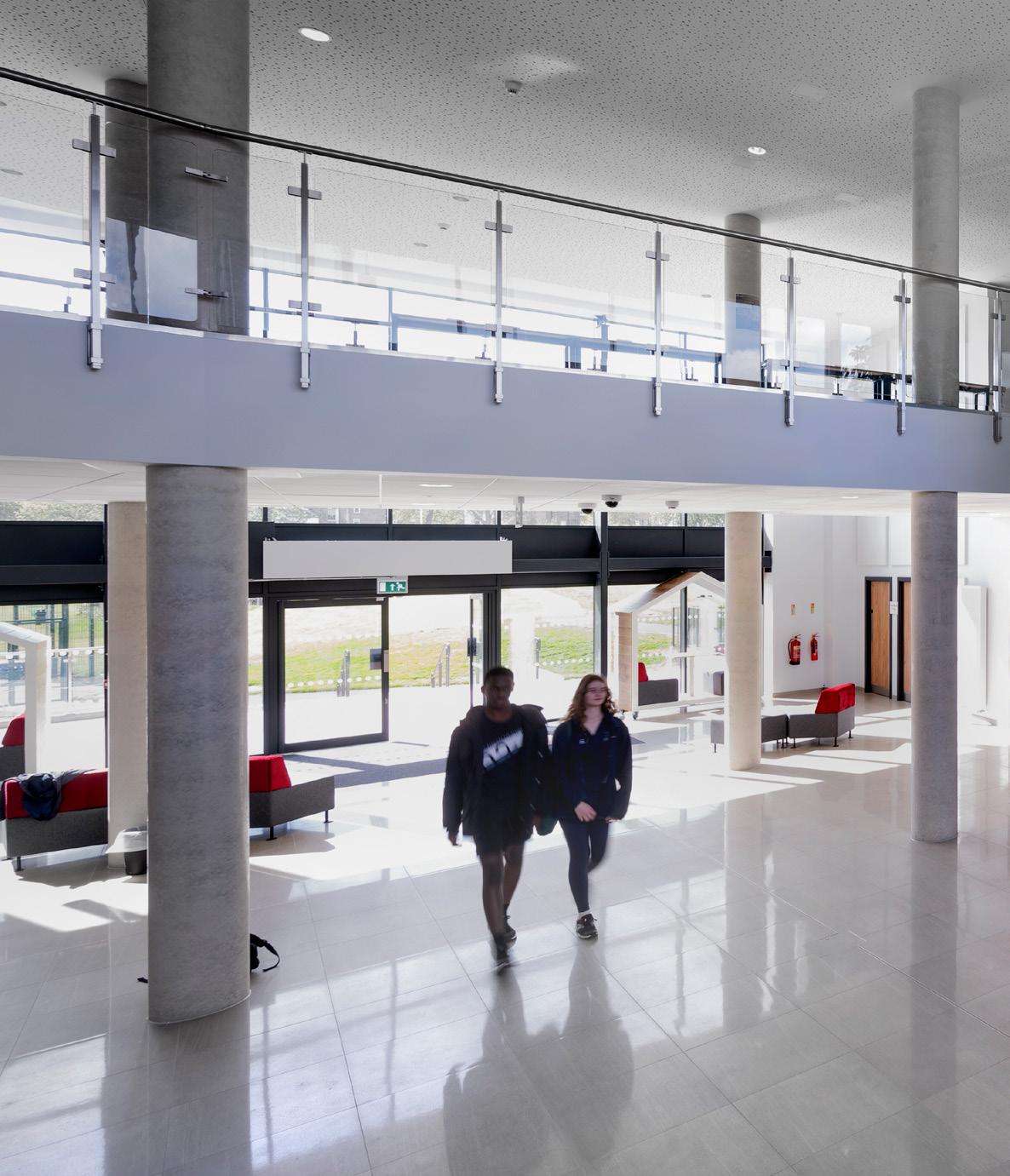
Year 12 Trinity 2
• End of year exams held: CCC+ grade transition to Y13 enacted or parental conversations held
• Work Experience week - placements around London companies
• Scholar and EPQ research projects first drafts worked on over the summer
Year 13
Michaelmas 1
• Subject learning begins, and Y12 material consolidated
• Prefecture continues; Diploma Scholars with mentor help take on new society groupings
• UCAS Finalizing Choices event; UCAS applications submitted and new Futures courses begun

• Aiming High students sit external tests; Diploma Scholar project 2nd drafts completed
Year 13
Michaelmas 2
• October Benchmark tests: subject support interventions follow
• Diploma Scholar project submitted and Diploma Scholar Symposium held
• New Futures courses begun; UCAS applications completed
• EPQ Projects submitted
Year 13
Lent 1
• Full subject trials held
• Final sets of Futures courses taken and society leadership begins to transition to Year 12 Scholars; Results of EPQ known
• Final visits made to universities applied for
Year 13
Lent 2
• UCAS choices narrowed to top two
• Final Prefecture term before hand over to Year 12
• Diploma Graduation Ceremony held; Alumnae invitations issued
Year 13
Trinity 1
• Final subject teaching and exam preparation followed by study leave
• Final exams taken
Year 13
Trinity 2
• Final exams continue
• Summer Ball
Diploma activities taken up:
200+
Number of A LEVEL SUBJECTS we offer:
24+
Numbers achieving A* or A grades
58%
each week as part of the Forder Programme
Natalie Seaton
Alice Bird
Nigel Higgins
Lord Drayson
Matthew D’Ancona
Chuka Umunna
Bill Muirhead
95% of students gained entry to their chosen universities in 2023
59th Independent School in the UK for A Level results (The Telegraph, 2023)
A dedicated WELLNESS CENTRE and lessons on WELLBEING , MENTAL HEALTH and NEURODIVERSITY
40 of green space for students to enjoy
ACRES
100% successful applications to Art Foundation Courses